Climate Control
15 Strategies for Boosting Heat Pump Efficiency
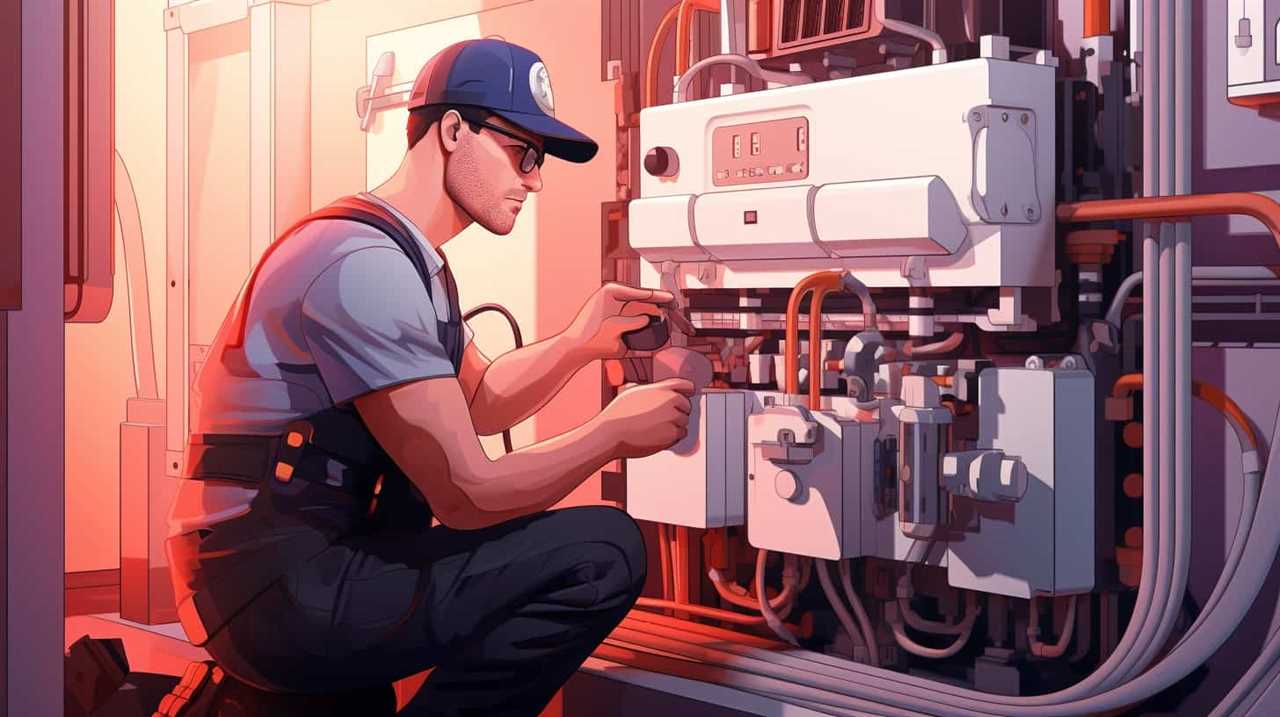
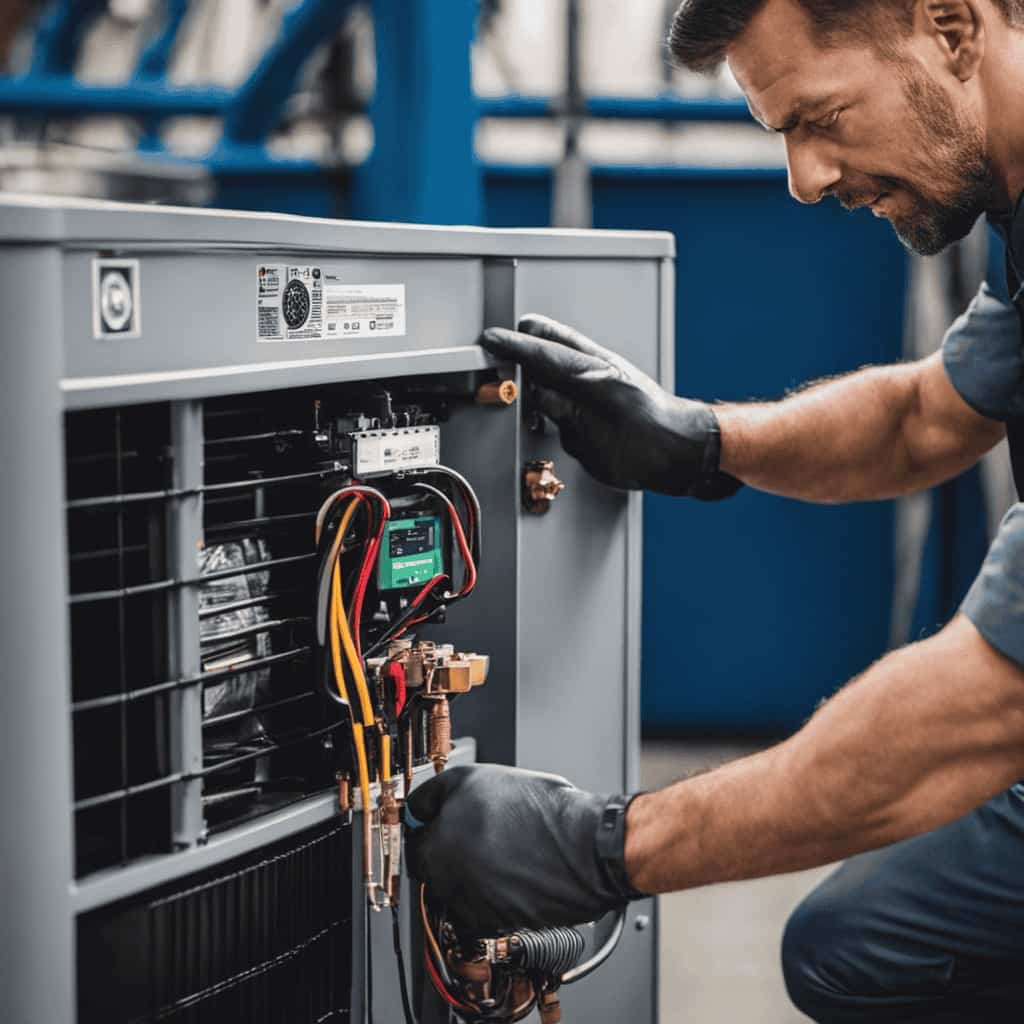
Fed up with soaring energy costs and ineffective heating solutions? Search no more! We present 15 effective tactics to enhance your heat pump’s efficiency and cut down on your expenses.
From understanding efficiency ratings to incorporating renewable energy sources, we’ve got you covered. With proper sizing, installation, and regular maintenance, you can optimize airflow and choose the right heat pump model for your needs.
Don’t wait – start saving today!
Key Takeaways
- Choosing a heat pump with high SEER and HSPF ratings ensures energy savings and lower utility bills.
- Proper sizing and installation techniques are crucial for maximizing heat pump efficiency.
- Regular maintenance by professionals and DIY cleaning tips enhance the performance and efficiency of the heat pump.
- Upgrading and optimizing with programmable thermostats, airflow and ventilation improvements, zone control systems, and insulating ductwork can significantly boost heat pump efficiency.
Understanding Heat Pump Efficiency Ratings
We will begin by explaining the importance of understanding heat pump efficiency ratings.
Proper maintenance techniques and energy saving tips are crucial for optimizing the efficiency of heat pumps.
Heat pump efficiency ratings indicate how effectively a heat pump can convert energy into heat or cool air. The ratings are expressed as a Seasonal Energy Efficiency Ratio (SEER) for cooling and a Heating Seasonal Performance Factor (HSPF) for heating. SEER measures the cooling efficiency of the heat pump, while HSPF measures the heating efficiency.
It’s essential to choose a heat pump with a high SEER and HSPF rating to ensure energy savings and lower utility bills.
Regular maintenance, such as cleaning or replacing air filters, checking refrigerant levels, and inspecting the outdoor unit, can also enhance the heat pump’s performance and efficiency.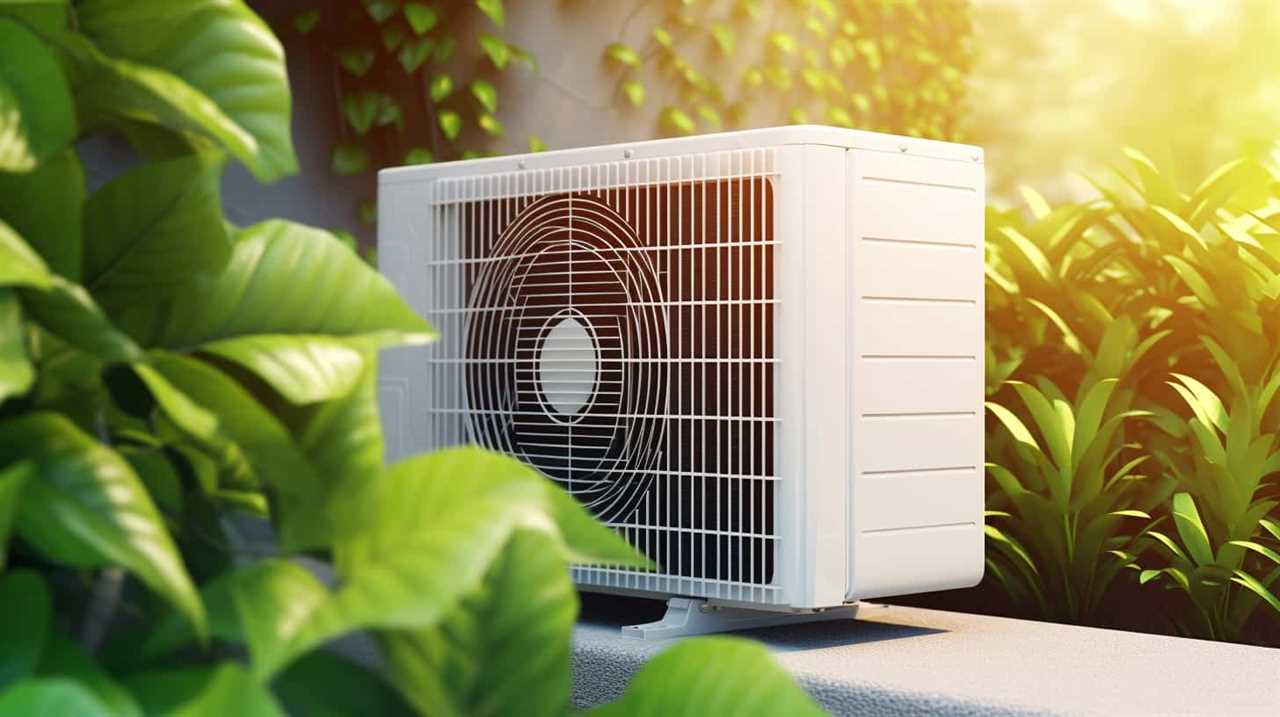
Proper Sizing and Installation Techniques
When it comes to heat pump efficiency, correct sizing and proper installation techniques are crucial. By ensuring that the heat pump is sized appropriately for the space it needs to heat or cool, we can maximize its efficiency and performance.
Additionally, using the right installation methods, such as proper insulation and sealing, can further enhance the heat pump’s efficiency by minimizing heat loss or gain.
Proper sizing and installation techniques go hand in hand in achieving optimal heat pump efficiency, resulting in energy savings and improved comfort.
Importance of Correct Sizing
Correctly sizing and installing heat pumps is crucial for maximizing efficiency and should always be done with careful consideration and attention to detail. The benefits of correct sizing are numerous.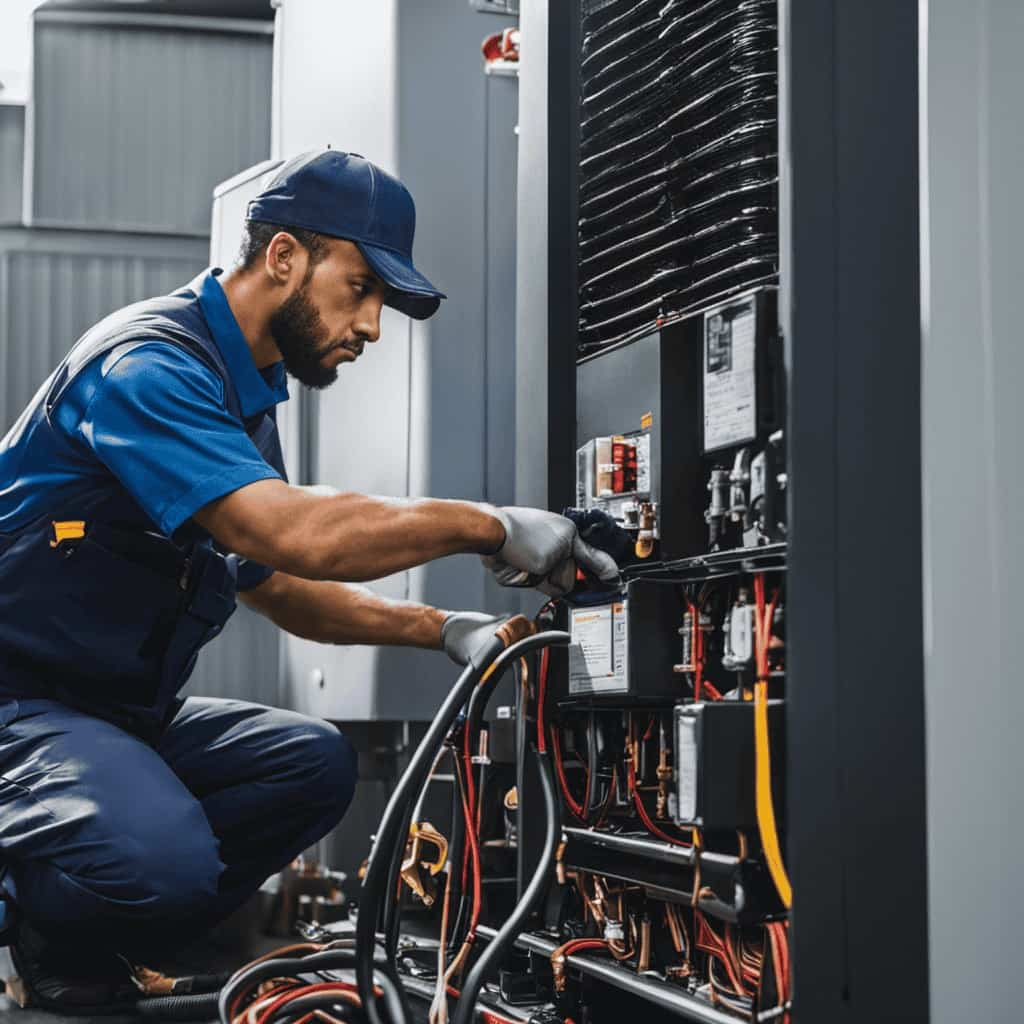
Firstly, it ensures that the heat pump operates at its optimal efficiency level, reducing energy consumption and lowering utility bills. Oversized systems tend to short cycle, resulting in frequent starts and stops, which can wear out components more quickly and decrease the overall lifespan of the unit. On the other hand, undersized systems may struggle to meet the heating or cooling demands of the space, leading to discomfort for occupants.
Additionally, proper installation techniques are equally important. This includes ensuring proper airflow, sealing ductwork, and proper refrigerant charge. These installation techniques contribute to improved heat pump performance and longevity, ensuring that the system operates efficiently for years to come.
Proper Installation Methods
To ensure optimal efficiency and performance, it’s crucial to properly size and install heat pumps using the appropriate techniques. By following proper installation methods, you can maximize the efficiency of your heat pump and improve its overall performance.
Here are three key installation techniques to consider: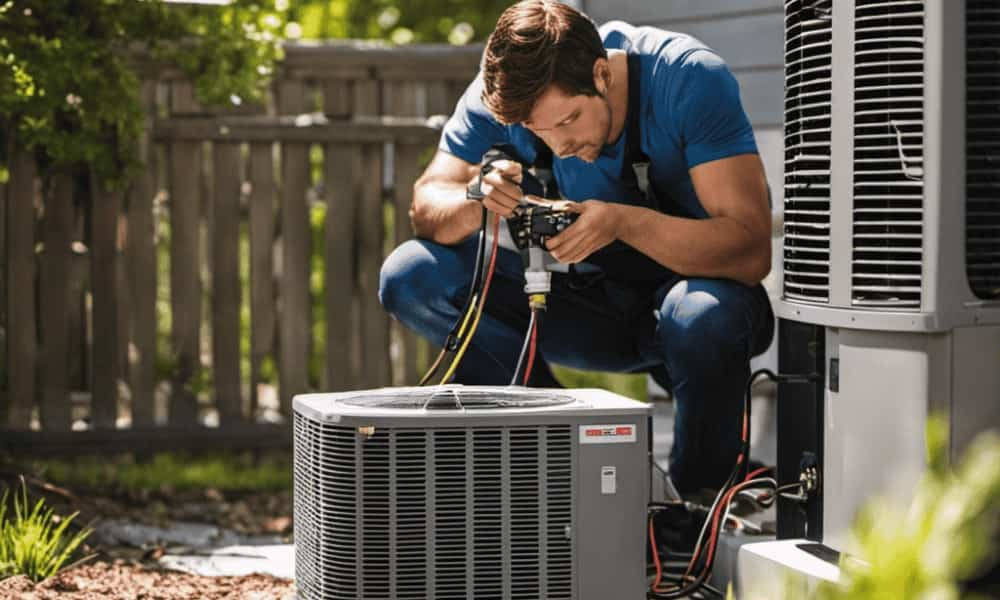
Correct sizing: It’s essential to accurately determine the heating and cooling load of your space. Undersized or oversized heat pumps can lead to inefficient operation and reduced comfort. By correctly sizing the heat pump, you can ensure that it operates at its peak efficiency.
Proper air distribution: Achieving balanced airflow throughout your space is essential for maximizing efficiency. Proper ductwork design and installation, along with regular maintenance, can help optimize air distribution, reducing energy waste and improving comfort.
Quality installation: A well-executed installation is critical for the long-term efficiency and performance of your heat pump. Ensure that the unit is correctly installed, with proper refrigerant charge and adequate airflow, to prevent energy losses and system malfunctions.
Efficiency Benefits of Both
We can maximize the efficiency of our heat pumps and improve their overall performance by implementing proper sizing and installation techniques. Proper sizing ensures that the heat pump is matched to the heating and cooling requirements of the space, optimizing performance and maximizing savings. Oversized or undersized heat pumps can lead to inefficient operation, increased energy consumption, and decreased comfort.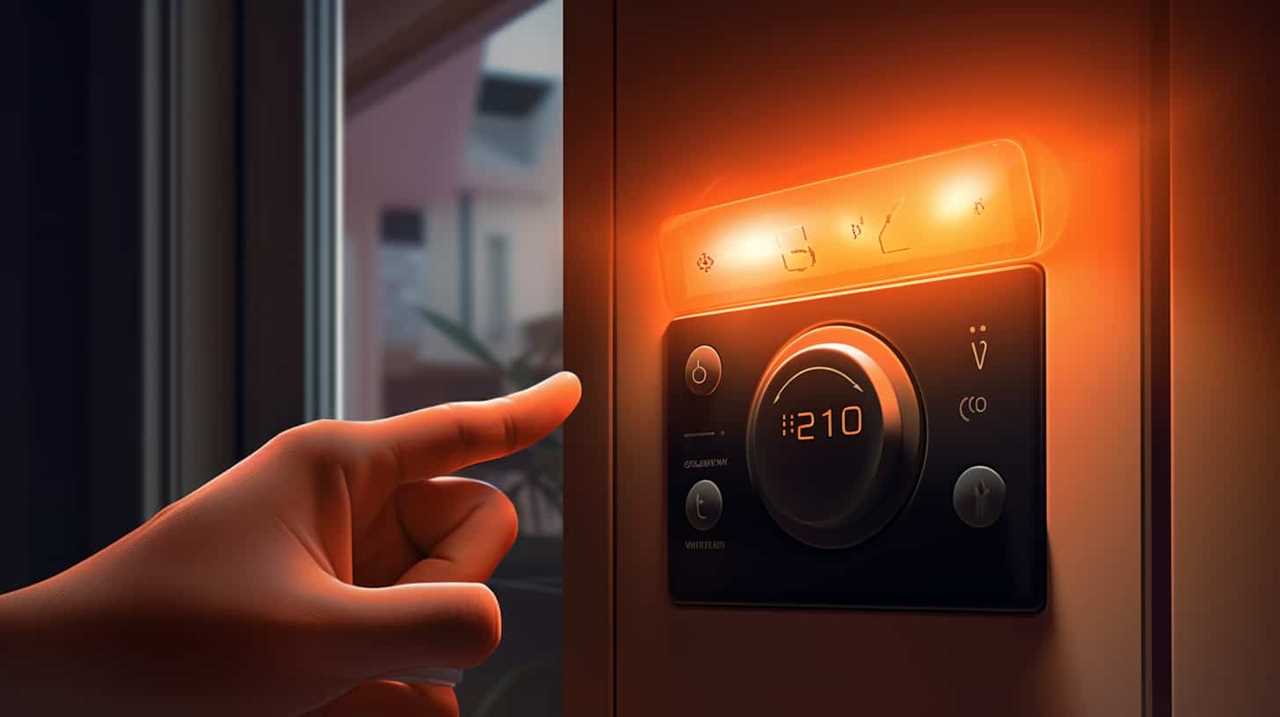
On the other hand, proper installation techniques, such as ensuring correct refrigerant charge, proper airflow, and adequate insulation, further enhance the efficiency of the system. These techniques help to minimize energy losses, reduce system strain, and ensure optimal heat transfer.
By combining proper sizing with correct installation methods, we can ensure that our heat pumps operate at their highest efficiency, providing us with optimal comfort and cost savings.
Transitioning into the next section on regular maintenance and cleaning, it’s important to note that these practices are also crucial for maintaining the efficiency of our heat pumps.
Regular Maintenance and Cleaning
Maintaining and cleaning your heat pump regularly is crucial for its optimal performance and efficiency. By scheduling regular professional maintenance, you can ensure that any potential issues are identified and resolved before they become major problems.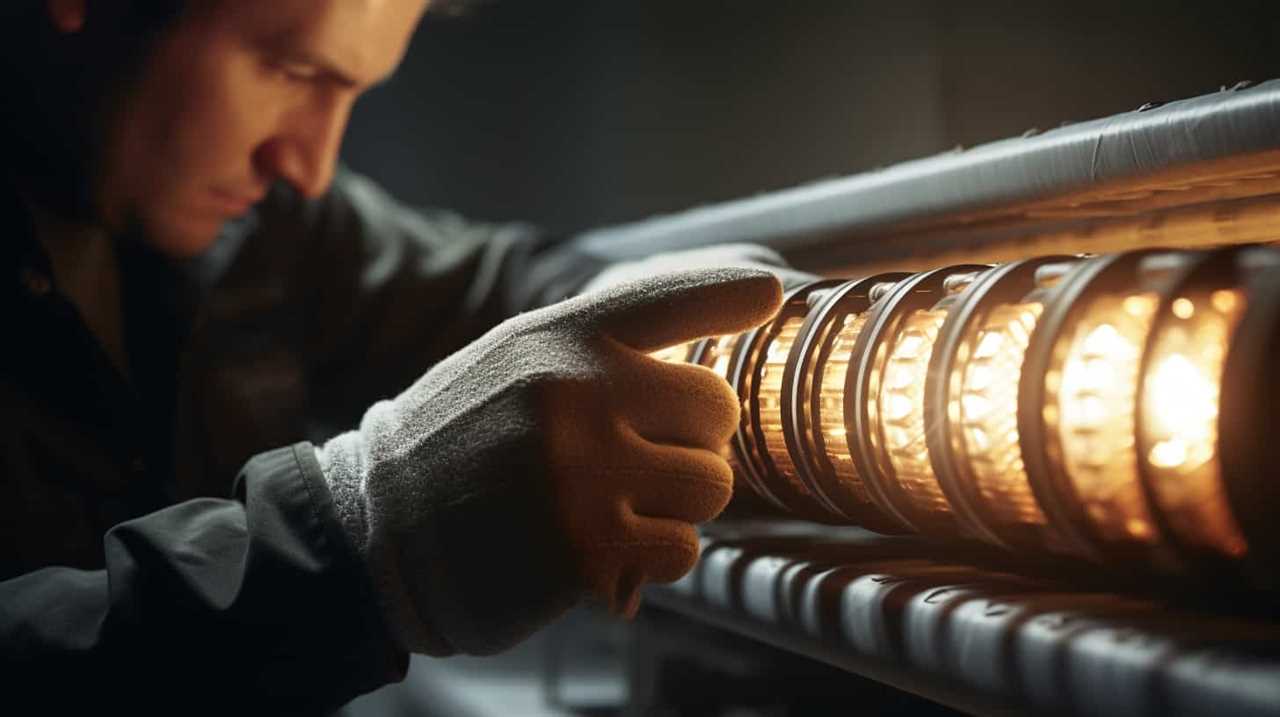
Additionally, there are several DIY cleaning tips that you can follow to keep your heat pump in top shape. Regular upkeep not only extends the lifespan of your heat pump but also helps it operate at peak efficiency, saving you money on energy costs.
Importance of Professional Maintenance
Regular maintenance and cleaning by a professional is essential for boosting the efficiency of our heat pump. Here are the key reasons why professional maintenance is crucial:
Professional maintenance benefits:
Extends the lifespan of the heat pump: Regular maintenance ensures that all components are functioning optimally, preventing premature wear and tear.
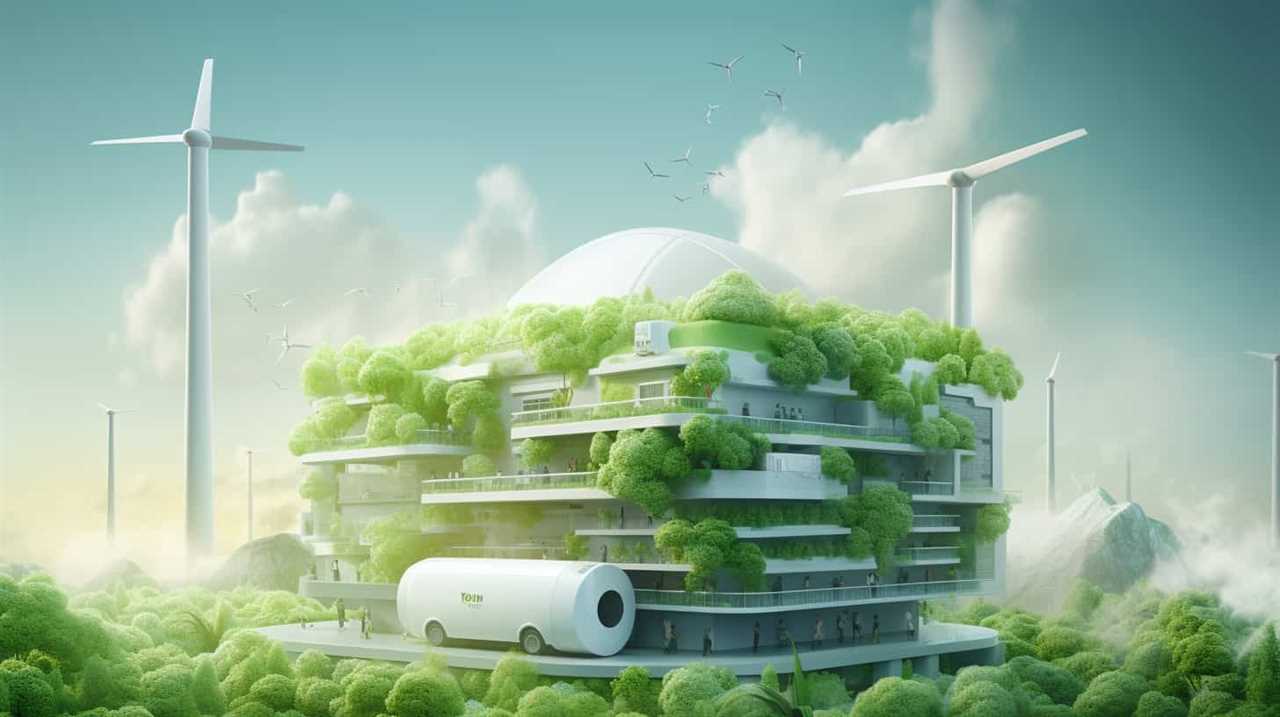
Enhances energy efficiency: A well-maintained heat pump operates more efficiently, reducing energy consumption and lowering utility bills.
Improves indoor air quality: Professional cleaning removes dirt, dust, and allergens from the system, resulting in cleaner and healthier air.
Cost-effective solutions:
Identifying potential issues early: Regular maintenance allows professionals to detect and resolve any potential problems before they escalate, saving you from costly repairs down the line.
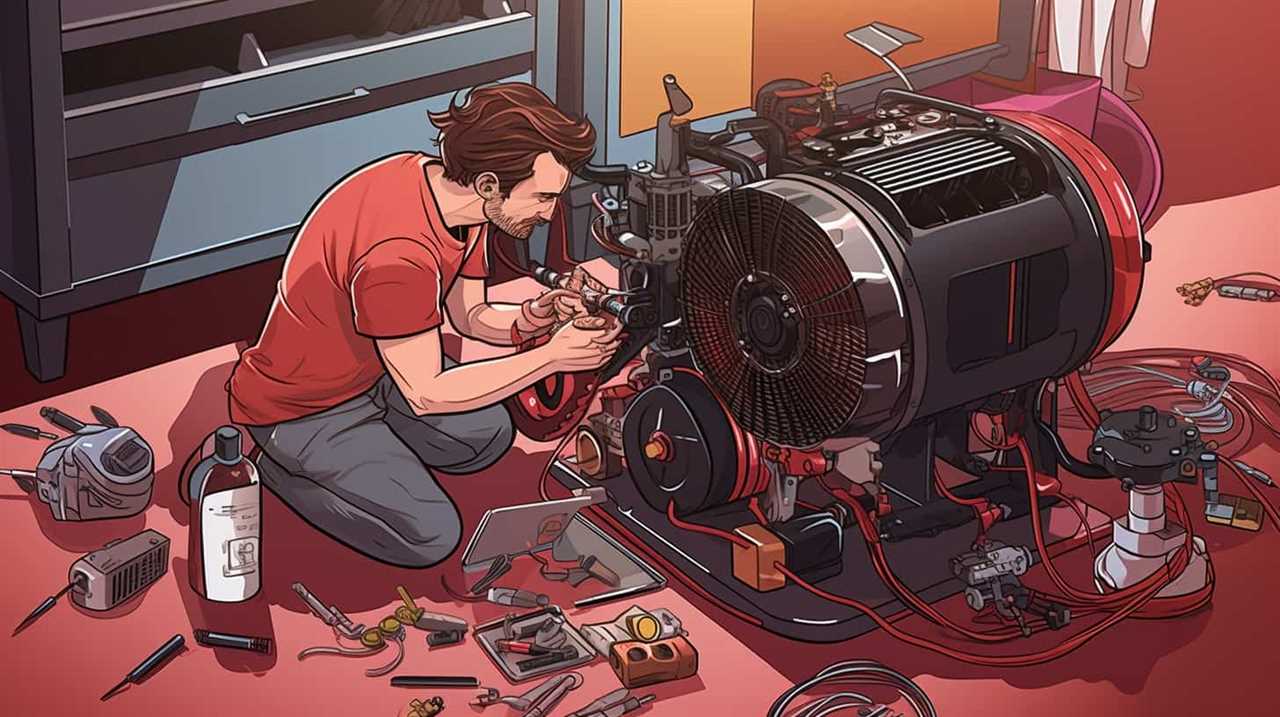
Optimal performance optimization: Professional maintenance ensures that the heat pump operates at its peak performance, maximizing its efficiency and reducing the need for frequent repairs.
DIY Cleaning Tips
One important step in maintaining the efficiency of our heat pump is to perform regular cleaning and maintenance tasks ourselves. DIY cleaning techniques can be cost-effective and help ensure that our heat pump operates optimally.
Regularly cleaning the outdoor unit is essential to remove any dirt or debris that may have accumulated. This can be done by gently spraying the unit with water using a garden hose.
Additionally, cleaning or replacing the air filters every few months is crucial to maintain proper airflow and prevent dust and dirt buildup. Homemade cleaning solutions can also be used for more thorough cleaning. For example, a mixture of vinegar and water can be used to clean the evaporator coils.
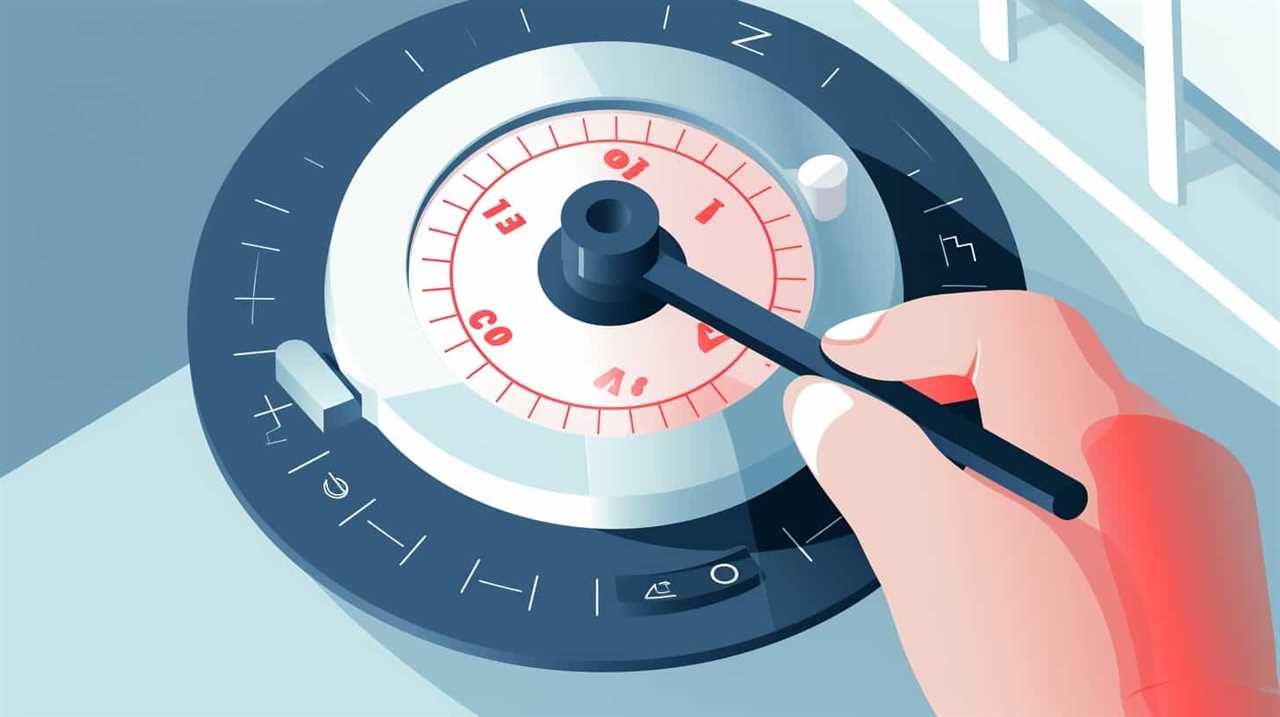
Regular cleaning and maintenance won’t only improve the efficiency of our heat pump but also extend its lifespan.
Benefits of Regular Upkeep
Regular upkeep of our heat pump, including regular maintenance and cleaning, offers numerous benefits for optimal performance and energy efficiency. It’s essential to prioritize regular maintenance to ensure the longevity and effectiveness of our heat pump system. Here are some key benefits of regular upkeep:
- Enhanced Energy Efficiency: Regular maintenance ensures that the heat pump operates at maximum efficiency, reducing energy consumption and lowering utility bills.
- Improved Performance: Routine maintenance helps identify and address any potential issues or malfunctions before they become major problems, ensuring that the heat pump performs optimally at all times.
- Prolonged Lifespan: Regular upkeep extends the lifespan of the heat pump, saving us from the cost and inconvenience of premature replacement.
Additionally, opting for professional maintenance offers several advantages:
- Expert Knowledge: Trained professionals possess the expertise to identify and resolve any underlying issues that may be affecting the heat pump’s efficiency.
- Thorough Inspection: Professionals conduct comprehensive inspections, ensuring that all components are functioning correctly and identifying any potential areas of concern.
- Compliance with Warranty: Regular professional maintenance often fulfills warranty requirements, protecting us from unexpected repair costs.
Investing in regular maintenance has long-term benefits for our heat pump, ensuring optimal performance, energy efficiency, and cost savings.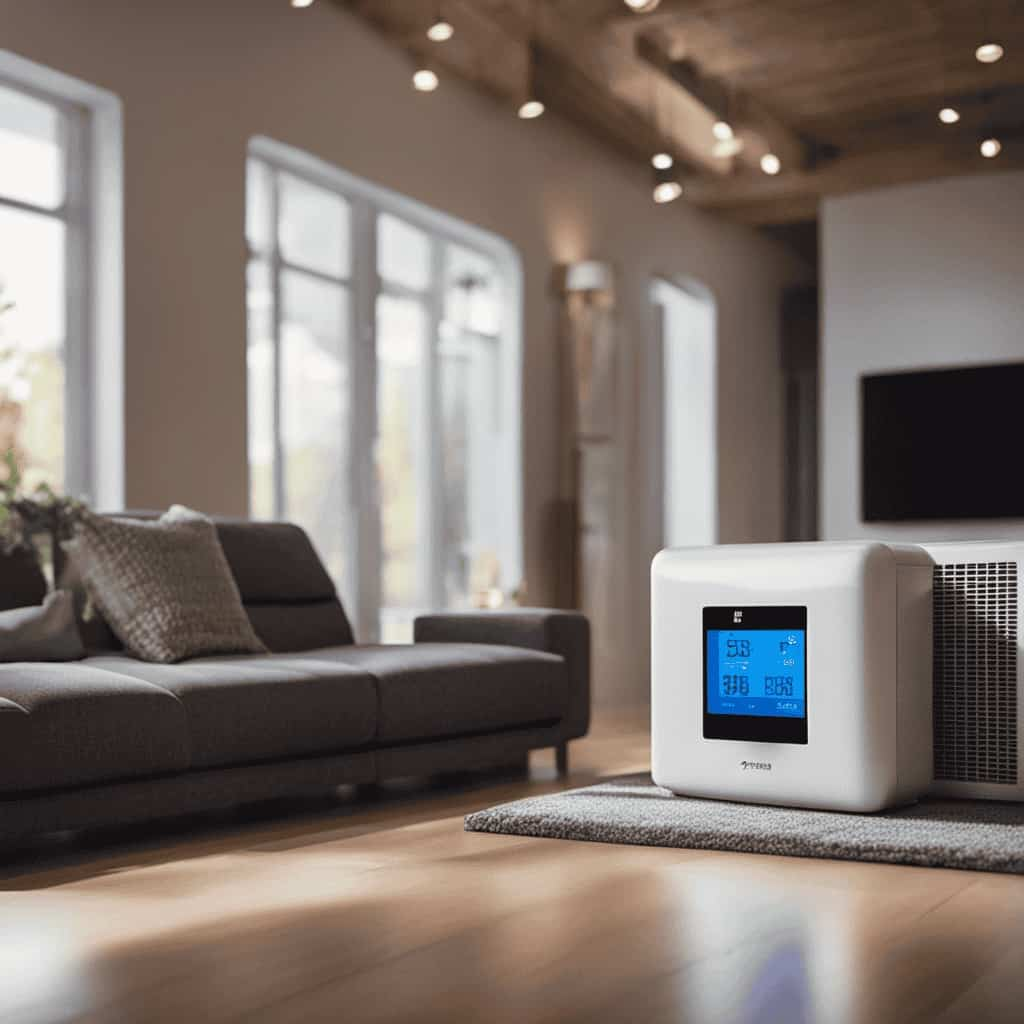
Upgrading to a Programmable Thermostat
We can significantly improve heat pump efficiency by upgrading to a programmable thermostat. By incorporating smart thermostat features and energy-saving programming, we can optimize the performance of our heat pump and reduce energy consumption.
Smart thermostat features include Wi-Fi connectivity, which allows us to control the temperature remotely through a smartphone app. This enables us to adjust the temperature based on our schedule and preferences, ensuring that the heat pump isn’t running unnecessarily.
Energy-saving programming allows us to set different temperature settings for different times of the day, so the heat pump operates at a lower capacity when we’re away or asleep. This minimizes energy usage without sacrificing comfort.
Upgrading to a programmable thermostat provides us with greater control over our HVAC system and helps us save on energy costs.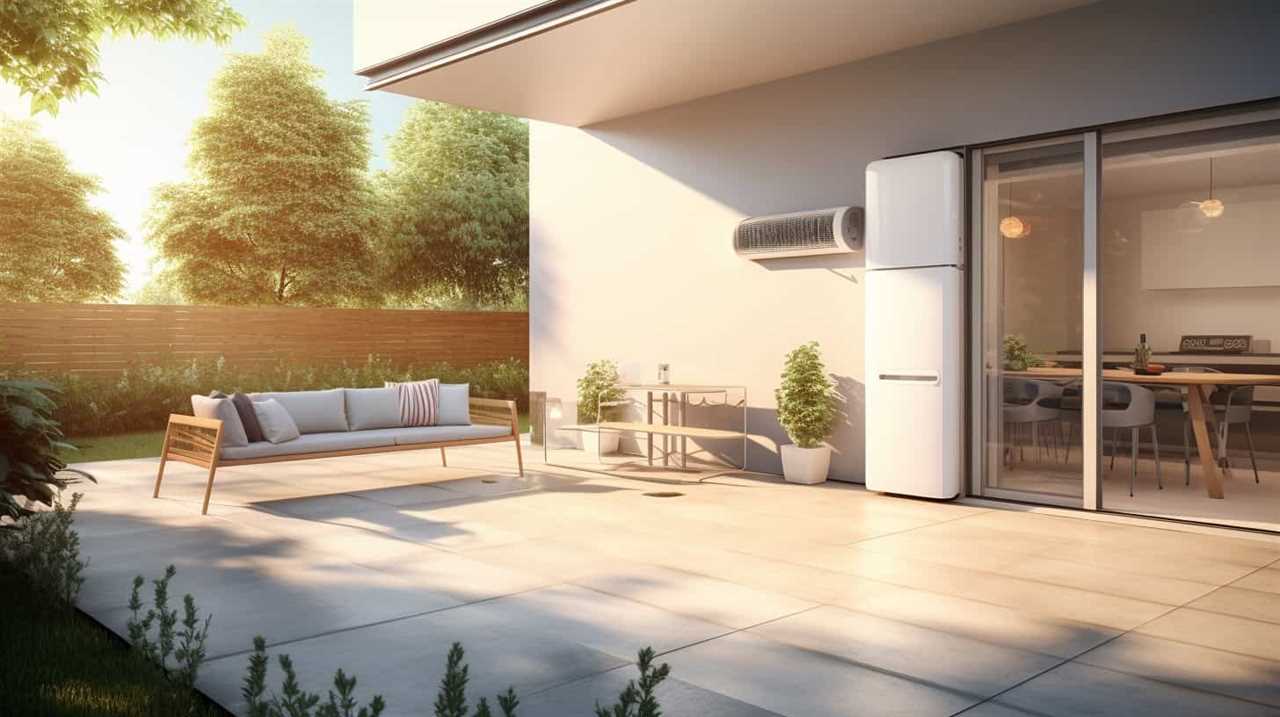
In the next section, we’ll explore the importance of optimizing airflow and ventilation to further enhance heat pump efficiency.
Optimizing Airflow and Ventilation
To optimize airflow and ventilation, we should regularly clean and replace air filters in our heat pump system. This simple task ensures that the air flowing through the system remains clean and free from debris, allowing for efficient operation.
In addition to filter maintenance, there are several other airflow optimization and ventilation techniques that can further enhance the performance of our heat pump system:
- Regularly inspect and clean the indoor and outdoor coils to remove any dirt or debris that may hinder airflow.
- Ensure that vents and registers are unobstructed and not blocked by furniture or other objects.
- Consider installing a ventilator or air exchanger to bring in fresh air and remove stale air, improving overall air quality.
By implementing these airflow optimization and ventilation techniques, we can maximize the efficiency of our heat pump system and enjoy a comfortable indoor environment.
Now, let’s explore another strategy for improving heat pump efficiency: utilizing zone control systems.
Utilizing Zone Control Systems
To enhance our heat pump efficiency, we can utilize zone control systems, which allow us to independently adjust the temperature in different areas of our home. This not only provides personalized comfort but also helps us save energy. By dividing our home into separate zones, we can optimize the heating and cooling in each area based on its individual needs. For instance, we can reduce energy consumption by heating or cooling only the occupied zones and adjusting the temperatures according to our preferences. The following table highlights the benefits of zone control systems and provides energy-saving techniques:
| Zone Control Benefits | Energy Saving Techniques |
|---|---|
| Personalized comfort | Adjusting temperatures based on occupancy |
| Energy savings | Heating or cooling only occupied zones |
| Increased efficiency | Utilizing programmable thermostats |
| Reduced wear and tear | Zoning different areas based on usage |
| Improved indoor air quality | Using zoning to manage ventilation |
Insulating and Sealing Ductwork
By properly insulating and sealing our ductwork, we can significantly improve the efficiency of our heat pump system. Insulating techniques and sealing methods play a crucial role in preventing energy loss and ensuring that conditioned air reaches its intended destination.
Here are three key considerations when it comes to insulating and sealing ductwork: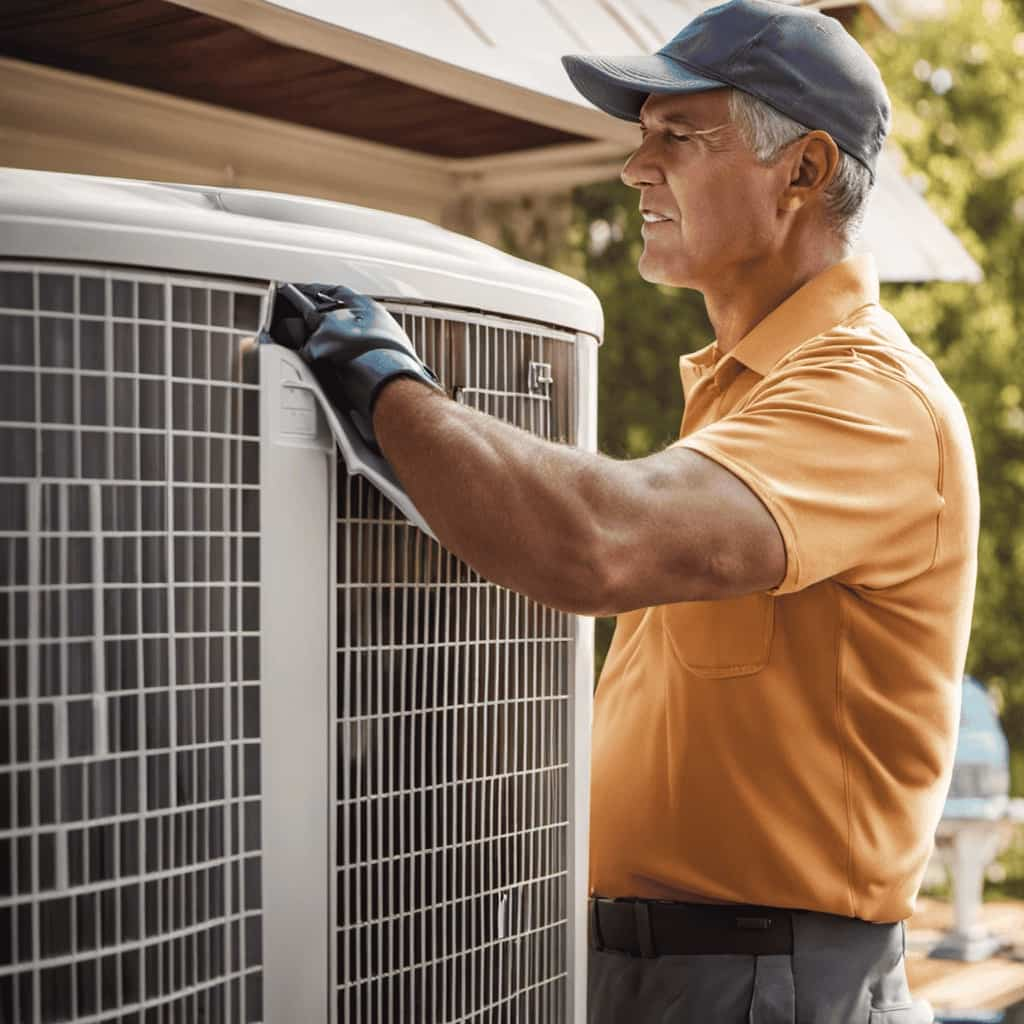
- Proper insulation materials: Using insulation materials with high R-values, such as fiberglass or foam board, can effectively minimize heat transfer and reduce energy loss.
- Sealing duct joints: It’s essential to seal all joints and connections in the ductwork to prevent air leakage. This can be achieved using mastic sealant or metal-backed tape.
- Duct insulation sleeves: Insulating sleeves can be installed around exposed ductwork to provide an extra layer of insulation and prevent condensation.
By implementing these insulating techniques and sealing methods, we can maximize the efficiency of our heat pump system and ensure that conditioned air is distributed effectively.
Now let’s explore the next topic of choosing the right heat pump model.
Choosing the Right Heat Pump Model
When choosing the right heat pump model, there are several important factors to consider.
First, size and capacity are crucial in ensuring that the heat pump can effectively heat or cool your space.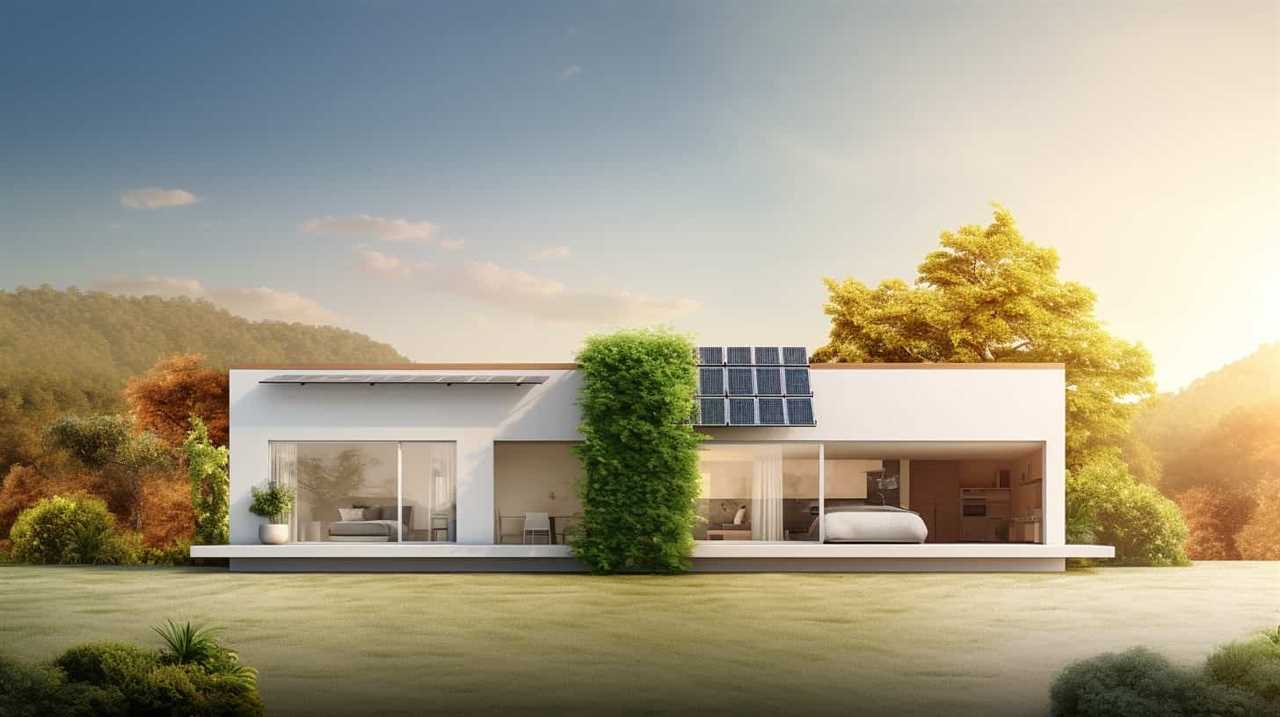
Energy efficiency ratings, such as the SEER and HSPF, should also be taken into account to determine the unit’s energy-saving capabilities.
Lastly, the climate and location of your area should be considered to select a heat pump that’s suitable for the specific temperature and weather conditions.
Size and Capacity
We need to carefully assess our heating needs and select the appropriate heat pump model to ensure optimum efficiency. When it comes to size and capacity, there are a few key factors to consider:
Proper sizing: It’s crucial to choose a heat pump that’s the right size for your home. Oversized units can lead to frequent on/off cycling, while undersized units may struggle to meet your heating demands.

Heat pump capacity: The capacity of the heat pump should match the heating requirements of your home. It’s determined by factors such as the size of the space, insulation levels, and climate conditions.
Energy-saving features: Look for heat pumps with energy-saving features like variable-speed compressors and programmable thermostats. These can help optimize performance and reduce energy consumption.
Energy Efficiency Ratings
Let’s explore the importance of energy efficiency ratings when selecting the right heat pump model for our needs. Understanding energy efficiency is crucial for improving energy performance and reducing our environmental impact.
When choosing a heat pump, it’s essential to consider its energy efficiency rating, which is indicated by the Seasonal Energy Efficiency Ratio (SEER) and Heating Seasonal Performance Factor (HSPF) ratings. The SEER rating measures the cooling efficiency of the heat pump, while the HSPF rating reflects its heating efficiency.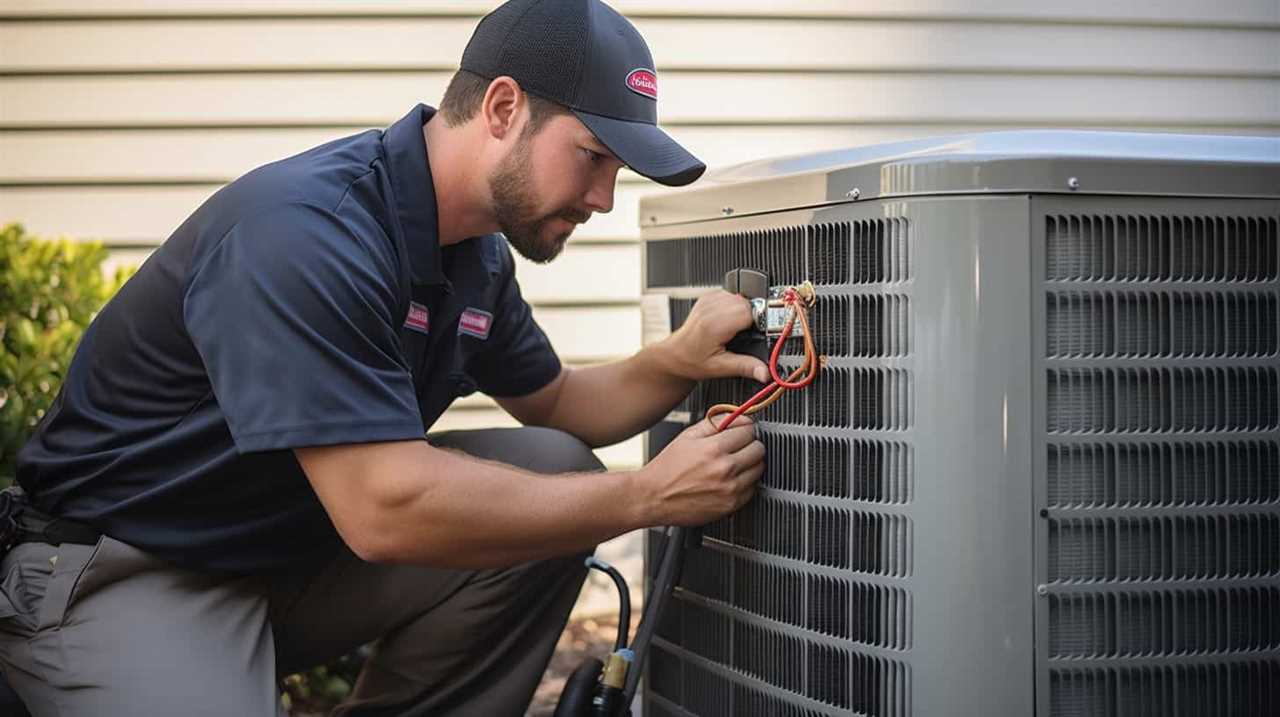
Higher SEER and HSPF ratings indicate better energy efficiency and lower operating costs. It’s recommended to choose a heat pump with a SEER rating of at least 14 and an HSPF rating of 8.2 or higher to ensure optimal energy efficiency.
Climate and Location
How can we determine the right heat pump model for our climate and location?
When it comes to selecting the most suitable heat pump, climate change and geographical factors play a crucial role. To help you make an informed decision, consider the following factors:
Average temperature range: Choose a heat pump model that can efficiently provide both heating and cooling based on the average temperature range in your area.

Humidity levels: If your location experiences high humidity, opt for a heat pump that includes dehumidification features to maintain a comfortable indoor environment.
Elevation and altitude: Higher elevations may require heat pumps specifically designed to handle the unique challenges posed by increased altitude.
Taking Advantage of Energy-saving Features
By utilizing energy-saving features, we can maximize the efficiency of our heat pump.
There are various strategies we can employ to reduce energy consumption and optimize the performance of our system. One effective approach is to utilize programmable thermostats. These devices allow us to schedule temperature adjustments based on our daily routines, ensuring that we only heat or cool our homes when necessary.
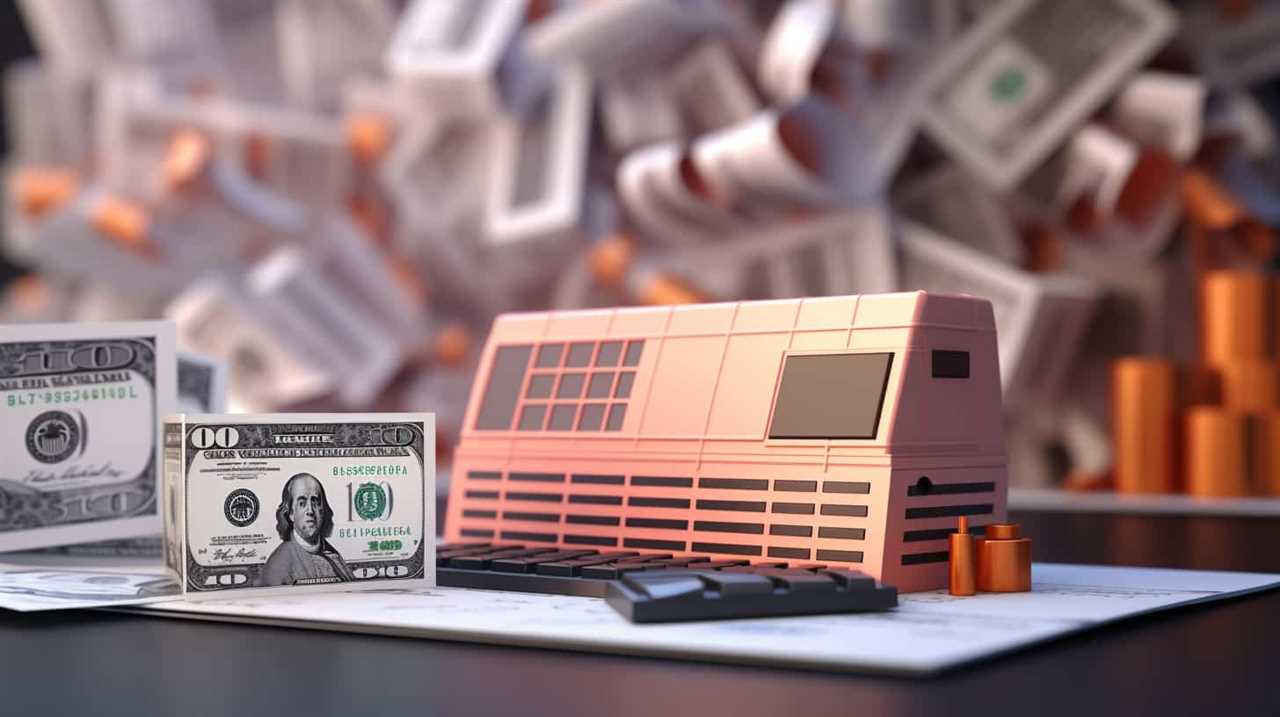
Another important feature is the variable-speed compressor, which allows the heat pump to adjust its output based on the heating or cooling demands. This results in more precise temperature control and reduced energy usage.
Additionally, investing in a heat pump with a high Seasonal Energy Efficiency Ratio (SEER) and Heating Seasonal Performance Factor (HSPF) can significantly improve energy efficiency.
Incorporating Renewable Energy Sources
While we can enhance the efficiency of our heat pump through various strategies, one effective approach is incorporating renewable energy sources. This not only helps reduce our carbon footprint but also lowers our energy costs in the long run.
To grab your attention, here are three key points about integrating renewable energy into your heat pump system:
Renewable energy integration: By harnessing the power of solar panels or wind turbines, we can generate clean and sustainable energy to supplement our heat pump’s electricity consumption. This reduces our reliance on fossil fuels and decreases our environmental impact.
Grid connectivity: Connecting our heat pump system to the electrical grid allows us to take advantage of excess renewable energy produced during peak times. This surplus energy can be stored or shared with the grid, ensuring a constant and uninterrupted power supply.
Serving others: Incorporating renewable energy sources not only benefits us but also contributes to the overall well-being of our community. By reducing our energy demands and reliance on non-renewable sources, we actively participate in building a more sustainable future for everyone.
Monitoring and Analyzing Energy Consumption
To effectively optimize our heat pump system, we should regularly monitor and analyze our energy consumption. Energy consumption analysis plays a crucial role in identifying areas of inefficiency and implementing measures to improve overall system performance.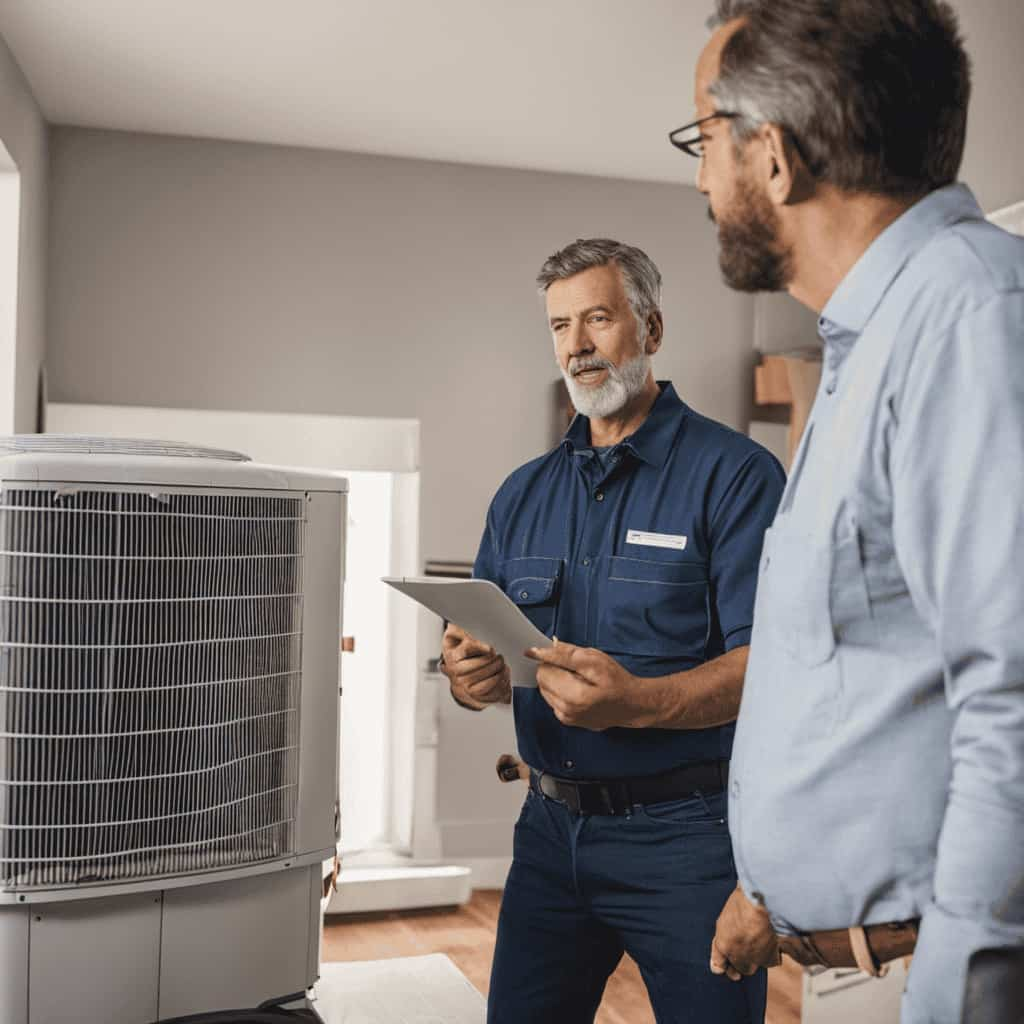
One way to accomplish this is by utilizing smart meter technology. Smart meters provide real-time data on energy usage, allowing us to track and understand our consumption patterns on a granular level. By analyzing this data, we can identify trends, peak usage periods, and potential energy-saving opportunities.
This information enables us to make informed decisions regarding system optimization, such as adjusting temperature settings, optimizing schedules, or implementing energy-saving measures.
Regular monitoring and analysis of energy consumption are essential for maximizing the efficiency of our heat pump system and reducing energy waste.
Frequently Asked Questions
Can I Use My Heat Pump in Extremely Cold Climates?
Yes, we can use our heat pump in extremely cold climates. However, it is important to consider heat pump efficiency in extreme cold climates and regularly maintain heat pump filters for optimal performance.
How Often Should I Clean or Replace the Air Filters in My Heat Pump?
Regular filter cleaning is crucial for heat pump maintenance. It improves efficiency and ensures clean air circulation. We recommend cleaning or replacing the air filters every 1-3 months, depending on usage and air quality.
Are There Any Government Incentives or Rebates Available for Upgrading to a More Energy-Efficient Heat Pump?
Yes, there are government incentives and rebates available for upgrading to a more energy-efficient heat pump. These programs offer financial benefits to encourage the use of environmentally friendly technology.
What Is the Average Lifespan of a Heat Pump?
The average lifespan of a heat pump depends on various factors, such as regular heat pump maintenance and proper care. However, signs of heat pump failure, such as reduced efficiency and increased energy consumption, may indicate the need for replacement.
Can a Heat Pump Be Used for Both Heating and Cooling Purposes?
Yes, a heat pump can be used for both heating and cooling purposes. This dual function feature allows for efficient temperature control in a cost-effective manner, improving overall heat pump efficiency.
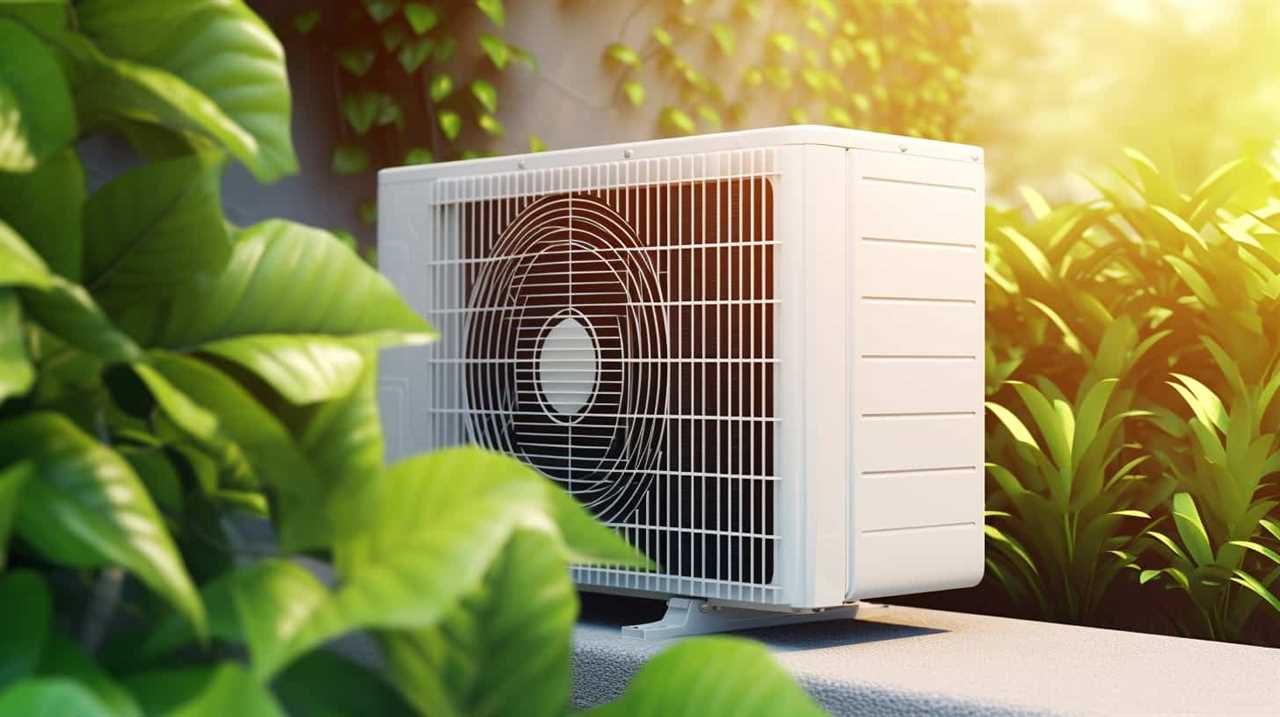
How Can Boosting Heat Pump Efficiency Contribute to Sustainable Climate Control?
Boosting heat pump efficiency has several key benefits of heat pumps, especially when it comes to sustainable climate control. Higher efficiency means less energy consumption, resulting in reduced greenhouse gas emissions. This contributes to combating climate change and creating a greener future. Additionally, improved efficiency translates into cost savings for homeowners, making heat pumps an environmentally and economically wise choice for climate control.
Conclusion
In conclusion, by implementing these 15 strategies for boosting heat pump efficiency, you’ll witness a mind-blowing transformation in your energy consumption. Your heat pump will become a sleek, energy-saving powerhouse that will leave you in awe of its performance.
From understanding efficiency ratings to incorporating renewable energy sources, every step ensures maximum efficiency and savings.
So don’t wait any longer, unleash the full potential of your heat pump and experience the extraordinary benefits it has to offer.
Climate Control
Unveiling the Efficiency Secrets of HVAC Heat Pumps

Prepare to discover the hidden treasures of HVAC heat pumps! In this article, we, your reliable experts, will unveil the efficiency tips that will transform your heating and cooling system.
By exploring the crucial role of proper insulation, optimizing airflow, selecting the right size, and maintaining your heat pump, we will empower you with the knowledge to achieve maximum efficiency.
Get ready to liberate your HVAC system and embrace a new era of comfort and cost savings.
Key Takeaways
- Proper insulation and weatherization are essential for maximizing HVAC heat pump efficiency.
- Regular maintenance, including filter cleaning and coil inspection, ensures optimal performance and longevity.
- Correctly sized and designed ductwork is crucial for balanced airflow and efficient operation.
- Advanced technologies such as smart controls and variable speed compressors can enhance heat pump efficiency and performance.
The Role of Proper Insulation in HVAC Heat Pump Efficiency
Why is proper insulation important for maximizing the efficiency of our HVAC heat pumps?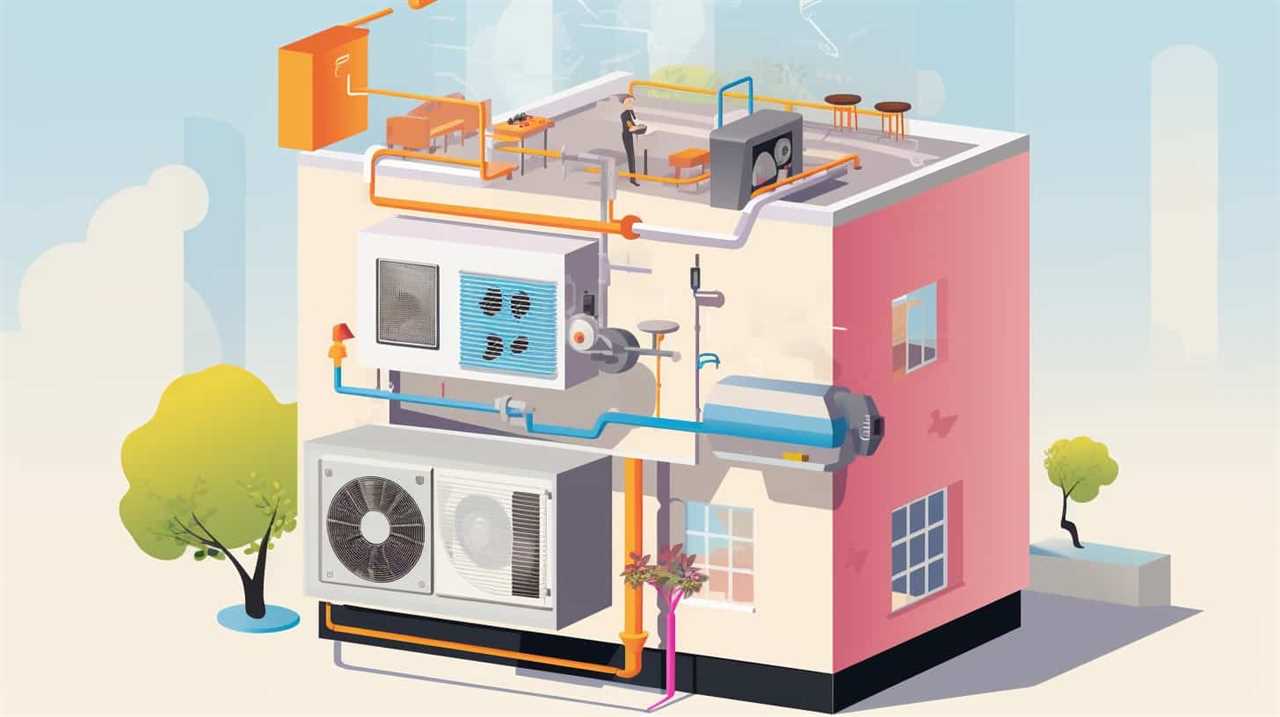
The role of weatherization in HVAC heat pump efficiency can’t be overstated. Proper insulation plays a crucial role in maintaining the desired indoor temperature while minimizing energy loss. Without adequate insulation, heat pumps must work harder to compensate for the escaped heat or cool air, resulting in reduced efficiency and increased energy consumption.
Additionally, the impact of ductwork on heat pump performance shouldn’t be overlooked. Leaky or poorly insulated ducts can lead to significant energy losses, compromising the overall efficiency of the system.
Optimizing Airflow for Enhanced HVAC Heat Pump Performance
To maximize the performance of our HVAC heat pumps, we need to optimize airflow for enhanced efficiency. Proper airflow management is crucial in achieving optimal heat pump operation and energy utilization. Here are three key strategies for heat pump optimization through airflow management:
Duct design and sizing: Ensure that the ductwork is correctly sized and designed to deliver the required airflow to each room. Improperly sized ducts can lead to air pressure imbalances and reduced system performance.
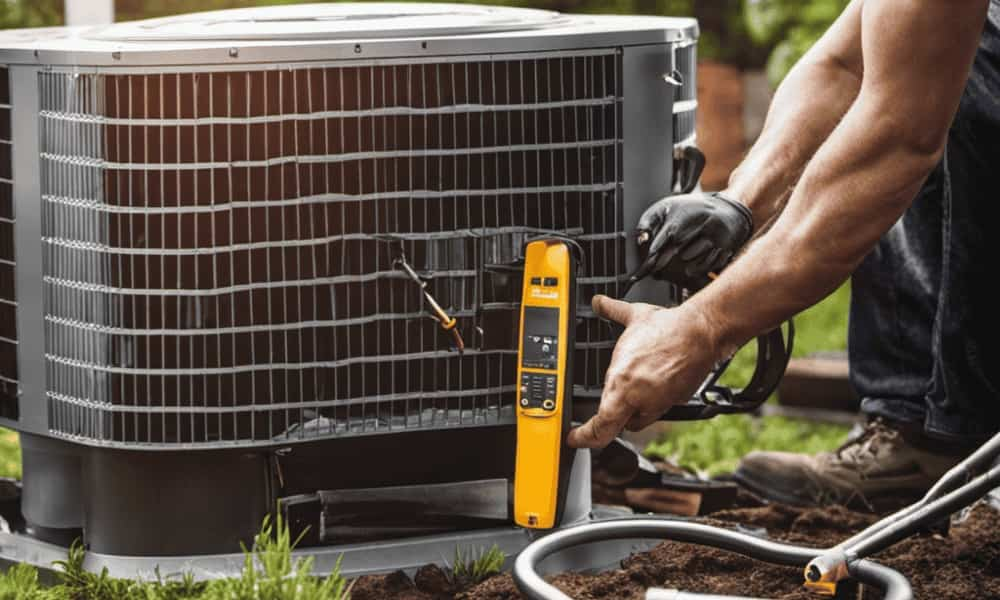
Regular filter maintenance: Clean or replace air filters regularly to prevent clogging and airflow restrictions. Restricted airflow can strain the heat pump, leading to decreased efficiency and increased energy consumption.
Airflow balancing: Balance the supply and return airflow throughout the system to maintain proper air distribution. Uneven airflow can result in hot or cold spots, reducing comfort and wasting energy.
Selecting the Right Size Heat Pump for Maximum Efficiency
We need to ensure that we select the right size heat pump for maximum efficiency. Sizing considerations play a crucial role in determining the energy consumption and overall performance of a heat pump.
Oversized heat pumps may lead to short cycling, where the unit turns on and off frequently, resulting in higher energy consumption and reduced efficiency.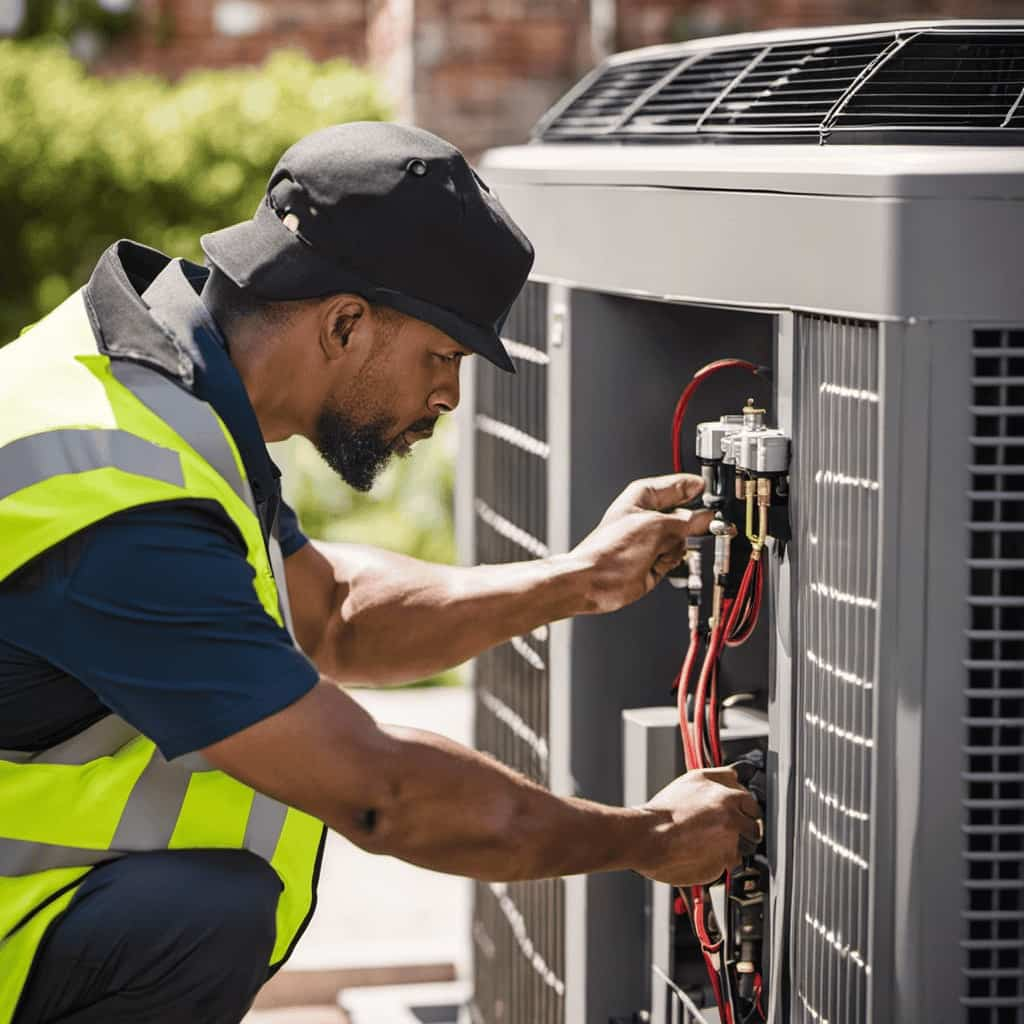
On the other hand, undersized heat pumps may struggle to meet the heating or cooling demands of the space, leading to increased energy usage and discomfort.
To select the right size heat pump, it’s important to consider factors such as the size and insulation of the space, climate conditions, and the heat pump’s heating and cooling capacity.
Conducting a thorough load calculation is essential to accurately determine the appropriate size of the heat pump for optimal efficiency.
The Importance of Regular HVAC Heat Pump Maintenance
Regular HVAC heat pump maintenance is essential for optimal performance and longevity. To ensure your heat pump operates at its best, it’s important to follow a regular maintenance checklist:

Cleaning the Filters: Dirty filters can restrict airflow and reduce efficiency. Regularly clean or replace filters to maintain optimal airflow.
Inspecting and Cleaning the Coils: Over time, coils can accumulate dirt and debris, hindering heat transfer. Regularly inspect and clean the coils to improve efficiency.
Checking Refrigerant Levels: Proper refrigerant levels are crucial for the heat pump’s performance. Regularly check and adjust refrigerant levels as needed.
By following these maintenance tasks, you can keep your heat pump operating efficiently and extend its lifespan.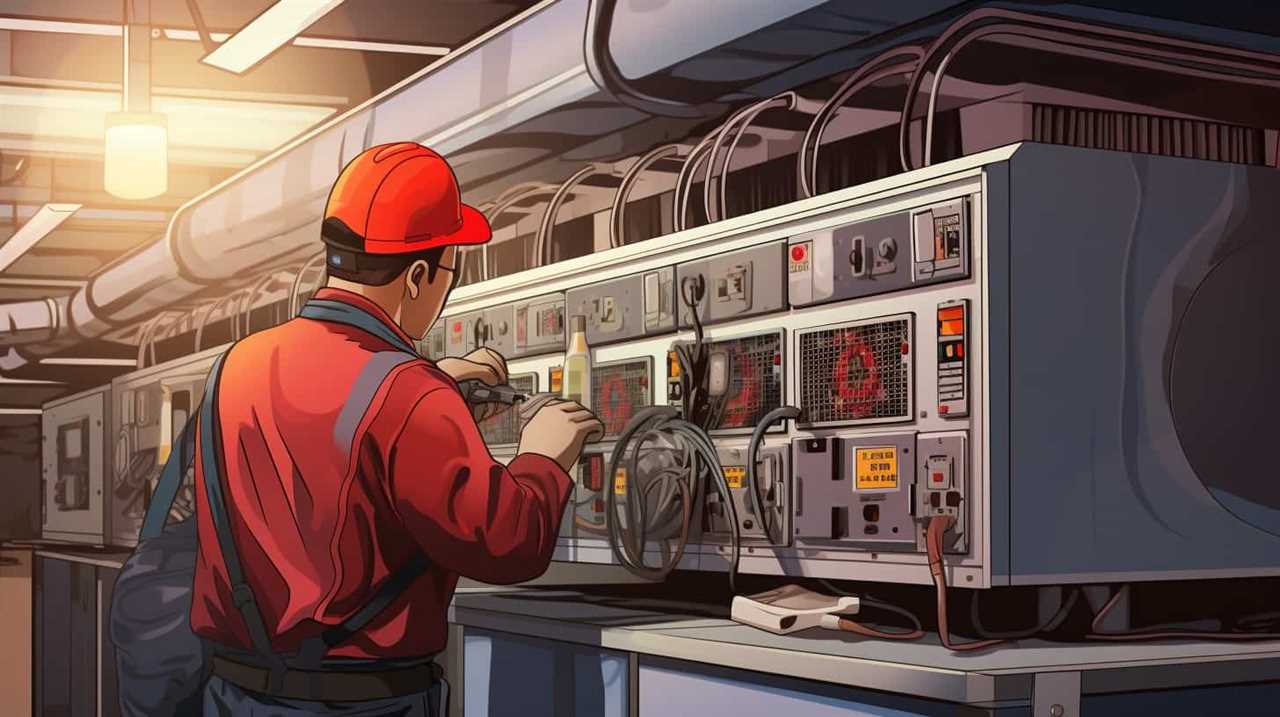
Now, let’s explore the advanced technologies for boosting HVAC heat pump efficiency.
Transition Sentence: Now that we understand the importance of regular maintenance, let’s delve into the advanced technologies that can further enhance the efficiency of HVAC heat pumps.
Advanced Technologies for Boosting HVAC Heat Pump Efficiency
Now, let’s explore how advanced technologies can enhance the efficiency of HVAC heat pumps.
One of the key advancements in boosting efficiency is the use of smart controls. These innovative systems utilize advanced algorithms and sensors to optimize the operation of heat pumps based on real-time conditions. By continuously monitoring factors such as indoor and outdoor temperatures, occupancy, and weather forecasts, smart controls can adjust the heat pump’s settings to maximize efficiency without sacrificing comfort.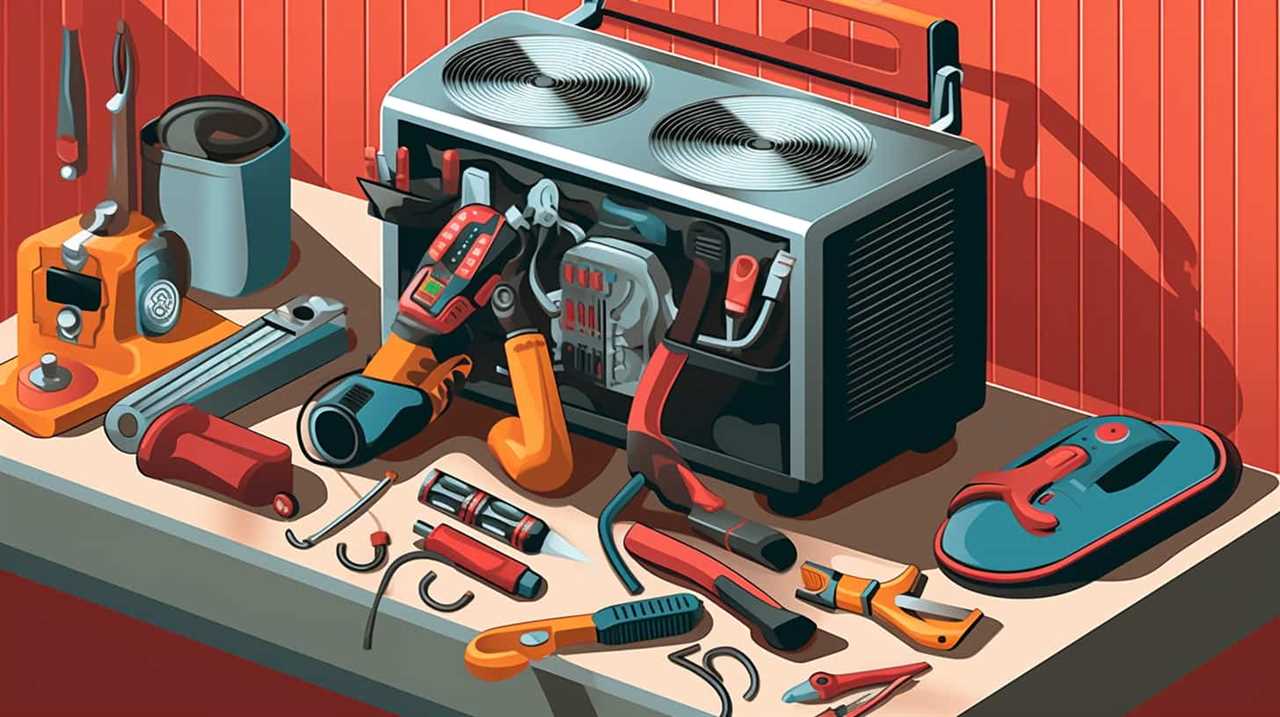
Another technology that can significantly improve HVAC heat pump efficiency is geothermal systems. These systems harness the stable underground temperature to provide heating and cooling, reducing the energy consumption of the heat pump. Geothermal systems also have the added benefit of being environmentally friendly, as they produce fewer greenhouse gas emissions compared to traditional HVAC systems.
Frequently Asked Questions
Can I Install an HVAC Heat Pump Without Proper Insulation and Still Expect It to Operate Efficiently?
Installing an HVAC heat pump without proper insulation can significantly impact its efficiency. Improper insulation can lead to energy consumption, airflow optimization, and size selection issues. Regular maintenance and the use of advanced technologies can enhance efficiency.
How Can I Improve the Airflow in My HVAC Heat Pump System to Enhance Its Performance?
To enhance our HVAC heat pump system’s performance, we must optimize fan speed and improve air circulation. These steps are crucial in achieving maximum efficiency and ensuring the liberation of our system’s full potential.
What Factors Should I Consider When Selecting the Right Size Heat Pump for My Home to Ensure Maximum Efficiency?
When selecting the right size heat pump for our home, we must consider factors like the square footage, insulation, and climate. Ensuring maximum efficiency requires finding the balance between capacity and energy consumption.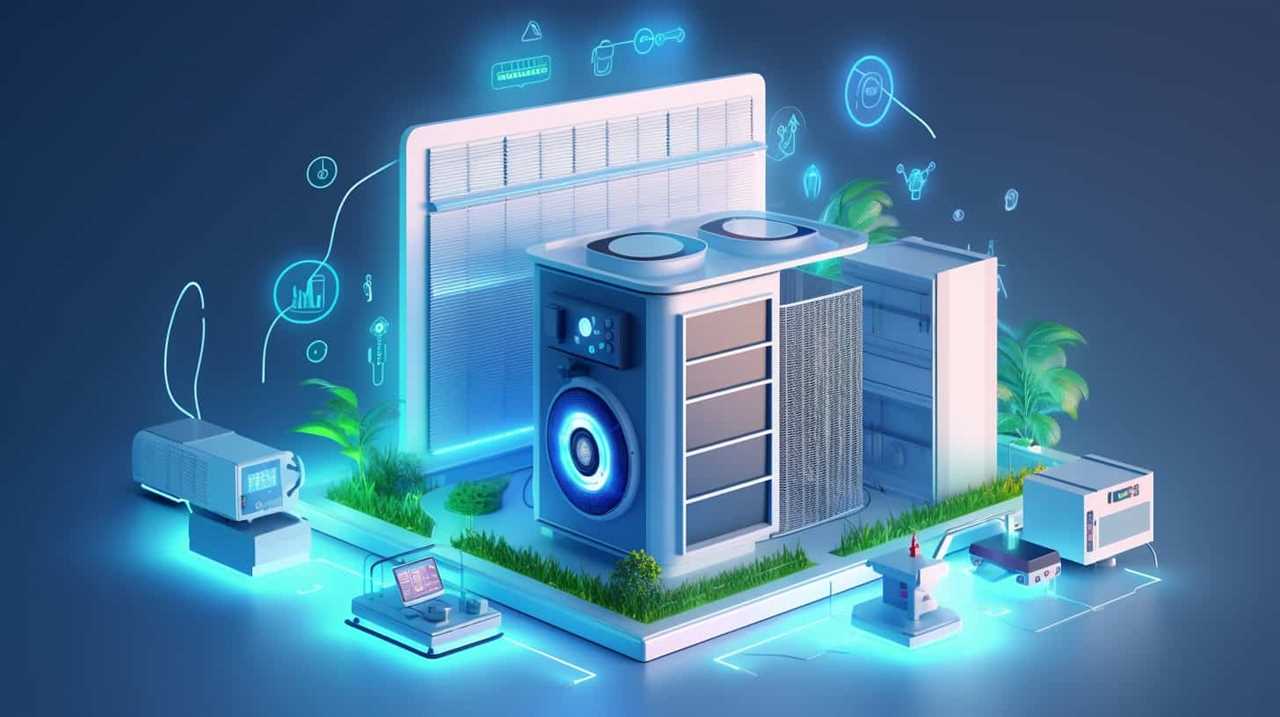
Is Regular Maintenance Necessary for HVAC Heat Pump Efficiency, and if So, How Often Should It Be Done?
Regular maintenance is crucial for HVAC heat pump efficiency. Neglecting it can significantly impact performance. To ensure longevity, we recommend scheduling maintenance regularly. Don’t underestimate the importance of this vital step in optimizing your system.
Are There Any Advanced Technologies Available That Can Further Boost the Efficiency of HVAC Heat Pumps, and How Do They Work?
Yes, there are advanced technologies available that can further boost the efficiency of HVAC heat pumps. These technologies work by optimizing energy usage, improving heat transfer, and incorporating smart controls for optimal performance.
What Are Some Insider Secrets to Maximize the Efficiency of Heat Pumps in HVAC Systems?
Maximizing heat pump efficiency secrets can significantly improve the performance of HVAC systems. Regular maintenance, such as cleaning or replacing air filters, ensures unrestricted airflow and optimal heat transfer. Properly insulating ductwork and sealing gaps reduce energy loss. Setting the thermostat at an appropriate temperature and using programmable features can avoid unnecessary energy consumption. Moreover, scheduling professional check-ups and considering upgrades or eco-friendly refrigerants can further enhance heat pump efficiency.
Conclusion
In conclusion, the efficiency secrets of HVAC heat pumps lie in proper insulation, optimized airflow, selecting the right size heat pump, regular maintenance, and advanced technologies.
These factors work together to enhance performance and maximize efficiency. Just like a well-oiled machine, a well-maintained HVAC heat pump operates smoothly and effectively, providing optimal heating and cooling while minimizing energy consumption.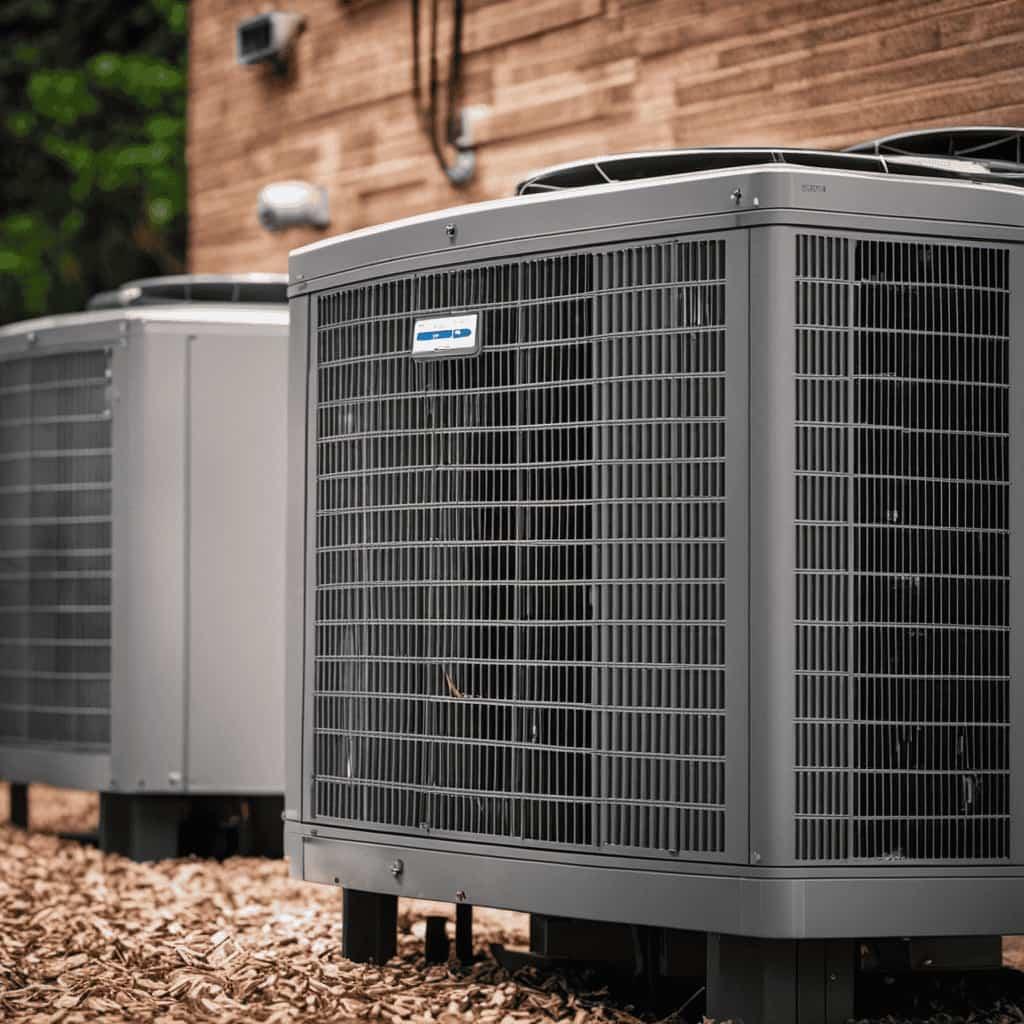
It’s like having a sleek, high-performance sports car that effortlessly glides through any climate.
Climate Control
Are Your Heat Pumps Energy-Efficient? Test With These Tips

Is your **heat pump** truly as energy-efficient as it claims to be? Test its efficiency with the help of these tricks. If you want to save money and reduce your energy consumption, this is the perfect opportunity to see if your **heat pump** is really doing its job. Keep reading to find out more!
We’ll break down heat pump efficiency ratings, explore proper sizing for optimal energy efficiency, and share maintenance tricks to maximize their performance.
Plus, we’ll dive into smart thermostat integration and programming tips, as well as energy-saving strategies for operating your heat pump.
Get ready to unlock the full potential of your heat pumps and enjoy the freedom of lower energy bills.
Key Takeaways
- Efficiency ratings (SEER and HSPF) determine if heat pumps are energy-efficient.
- Proper sizing and regular maintenance maximize energy savings.
- Integration of smart thermostats and programming can improve efficiency.
- Implementing energy-saving strategies such as proper installation, temperature control, and zoning can optimize heat pump operation.
Understanding Heat Pump Efficiency Ratings
We need to understand the efficiency ratings of our heat pumps to determine if they’re energy-efficient. With recent advancements in heat pump technology, there are now more energy-efficient models available on the market.
To compare the energy efficiency of different heat pump models, we can look at their efficiency ratings. These ratings are measured using a metric called the Seasonal Energy Efficiency Ratio (SEER) for cooling and the Heating Seasonal Performance Factor (HSPF) for heating. The higher the SEER or HSPF rating, the more energy-efficient the heat pump is.
When comparing energy-efficient heat pump models, it’s important to consider both the SEER and HSPF ratings to ensure that you’re making an informed decision. By understanding these efficiency ratings, we can choose heat pumps that aren’t only technologically advanced but also energy-efficient.
Proper Sizing for Optimal Energy Efficiency
Our goal is to ensure that our heat pumps are properly sized for optimal energy efficiency. Proper sizing is essential to maximize energy savings and ensure that your heat pump operates efficiently. Here are some energy saving tips to consider when it comes to proper sizing:
Consider the size of your home: The square footage of your home plays a crucial role in determining the size of the heat pump you need. A heat pump that’s too small will struggle to heat or cool your home effectively, while one that’s too large will cycle on and off frequently, wasting energy.
Insulation and air sealing: Proper insulation and air sealing are important factors affecting efficiency. Ensuring that your home is well-insulated and air sealed will help prevent heat loss or gain, allowing your heat pump to work more efficiently.
Ductwork: Properly sized and sealed ductwork is crucial for efficient heat pump operation. Leaky or improperly sized ducts can result in energy loss and reduced efficiency.
By considering these factors, you can ensure that your heat pump is properly sized for optimal energy efficiency.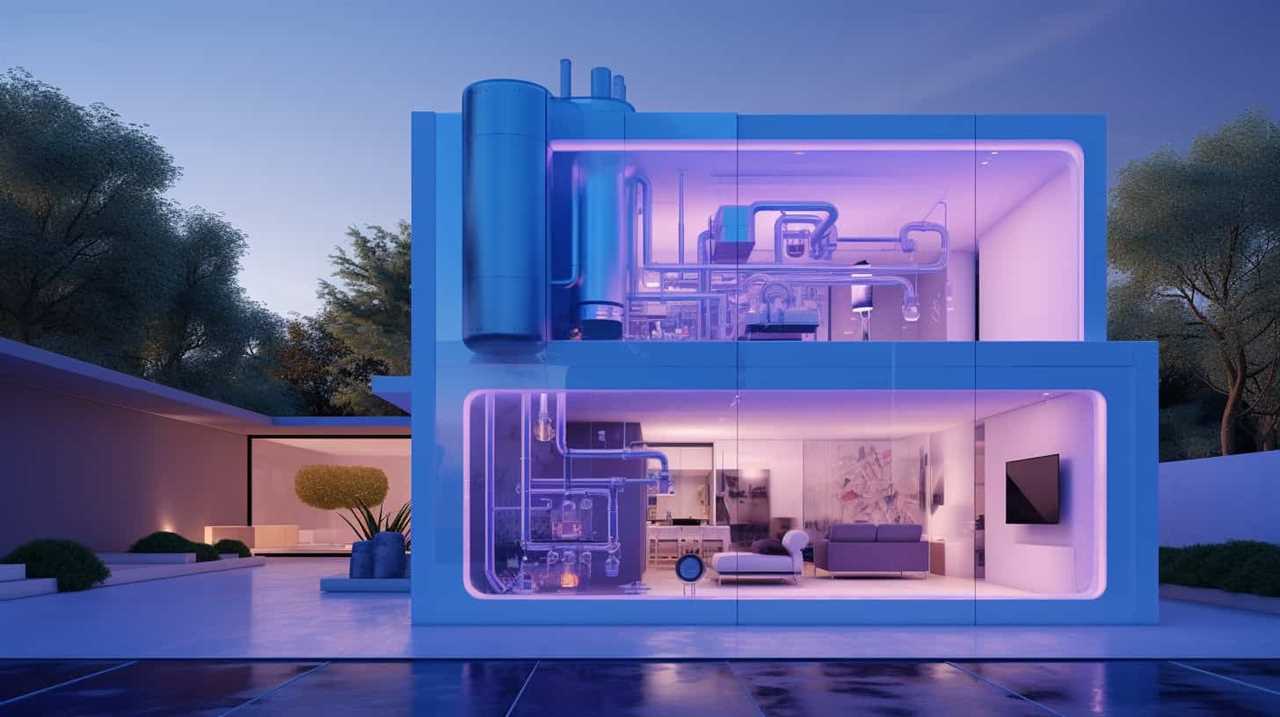
Now let’s move on to the next section, where we discuss regular maintenance to maximize efficiency.
Regular Maintenance to Maximize Efficiency
To ensure maximum efficiency, we should regularly maintain our heat pumps with proper cleaning and inspections. By following a maintenance checklist, we can keep our heat pumps running smoothly and avoid costly repairs.
First, it’s important to clean or replace air filters every one to three months. Clogged filters restrict airflow and reduce efficiency.
Next, we should inspect the outdoor unit for any debris or vegetation that may obstruct airflow. Additionally, we should check the thermostat settings to ensure they’re accurate and adjust them as needed.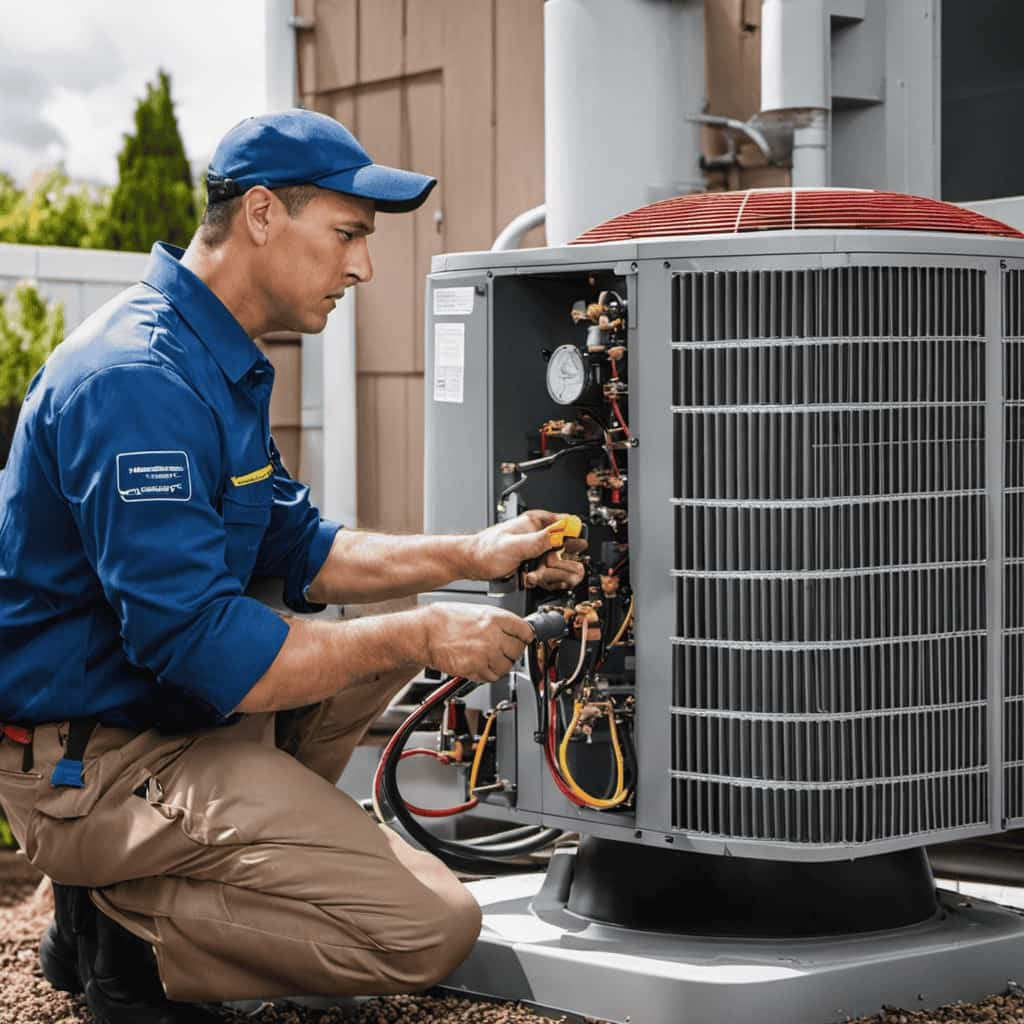
Troubleshooting tips include checking for any unusual noises, leaks, or inadequate heating or cooling performance.
Regular maintenance not only maximizes efficiency but also extends the lifespan of our heat pumps, saving us money in the long run.
Smart Thermostat Integration and Programming Tips
One key tip for integrating and programming smart thermostats is to set a schedule with specific temperature adjustments throughout the day. This allows you to maximize energy efficiency by only using heating or cooling when necessary. Smart thermostats offer a range of energy-saving features to help you achieve this goal.
Here are some tips on how to program your smart thermostat for maximum energy efficiency:
- Take advantage of the thermostat’s learning capabilities by allowing it to adapt to your schedule and preferences.
- Utilize the geofencing feature, which uses your smartphone’s location to adjust the temperature when you’re away from home.
- Use the energy-saving mode, which automatically adjusts the temperature to save energy when you’re not at home.
By programming your smart thermostat effectively, you can reduce energy waste and save money on your heating and cooling bills.
Now, let’s explore energy-saving strategies for heat pump operation.
Energy-Saving Strategies for Heat Pump Operation
To maximize energy efficiency, we can implement various strategies for operating heat pumps.
One important strategy is to ensure proper heat pump installation. This includes proper sizing and positioning of the unit, as well as ensuring proper insulation and sealing of ductwork.
Another energy-saving tip is to set the thermostat to the most energy-efficient temperature. For heating, setting the thermostat between 18-20 degrees Celsius (64-68 degrees Fahrenheit) is recommended, while for cooling, setting it between 24-26 degrees Celsius (75-78 degrees Fahrenheit) is ideal.
Additionally, it’s important to regularly clean or replace air filters to ensure optimal airflow and energy efficiency.
Finally, using a programmable or smart thermostat can help optimize energy usage by automatically adjusting temperature settings based on your schedule and preferences.
Frequently Asked Questions
How Do I Know if My Heat Pump Is Energy-Efficient?
We can determine if our heat pump is energy-efficient by considering factors such as improving insulation and the benefits of regular servicing. This helps us make informed choices and achieve energy savings.
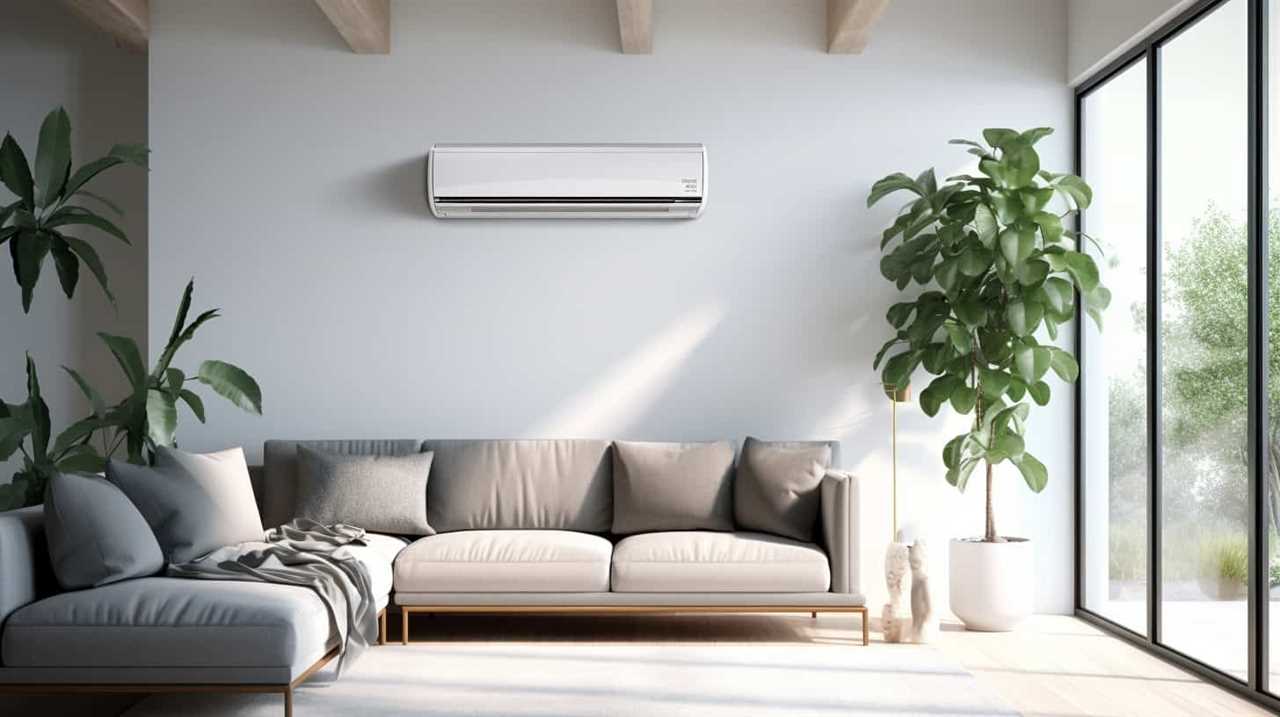
Can I Still Achieve Energy Efficiency With a Heat Pump That Is Not Properly Sized for My Home?
Yes, you can still achieve energy efficiency with a heat pump that is not properly sized for your home. However, it may not operate as efficiently as a properly sized one, leading to higher energy consumption and costs.
What Are Some Common Maintenance Tasks That Can Help Maximize the Efficiency of My Heat Pump?
Heat pump maintenance is essential for maximizing efficiency. Regularly clean or replace air filters, clear debris from outdoor units, and schedule professional inspections. These tips can help ensure our heat pumps operate at peak energy efficiency.
Are There Any Specific Tips for Integrating a Smart Thermostat With a Heat Pump for Optimal Energy Efficiency?
Integrating a smart thermostat with our heat pumps can optimize energy efficiency. We can save more by utilizing energy-saving features such as programmable schedules, remote access, and smart algorithms that adapt to our preferences.
Besides Regular Maintenance and Smart Thermostat Integration, What Other Strategies Can I Adopt to Save Energy While Operating My Heat Pump?
Energy saving habits, such as setting a programmable thermostat and keeping the temperature moderate, can help save energy when operating heat pumps. Additionally, proper insulation techniques can prevent energy loss and increase efficiency.
What Are the Secrets to Ensuring Optimal Heat Pump Efficiency in Eco-Buildings?
Achieving optimal heat pump efficiency in eco-buildings requires a multi-faceted approach. Firstly, proper insulation and airtight construction minimize heat loss or infiltration. Secondly, regular maintenance and clean air filters ensure optimal heat exchange and airflow. Lastly, employing smart thermostat systems that optimize temperature settings and take advantage of renewable energy sources further enhance heat pump efficiency in eco-buildings.
Conclusion
In conclusion, understanding and maximizing the efficiency of your heat pump is crucial for saving energy and reducing costs.
By considering heat pump efficiency ratings, sizing, regular maintenance, and integrating a smart thermostat, you can optimize its performance.
Implementing energy-saving strategies will also help to ensure your heat pump operates at its best.
So, take control of your energy usage and let your heat pump work smarter, not harder, to keep you comfortable all year round.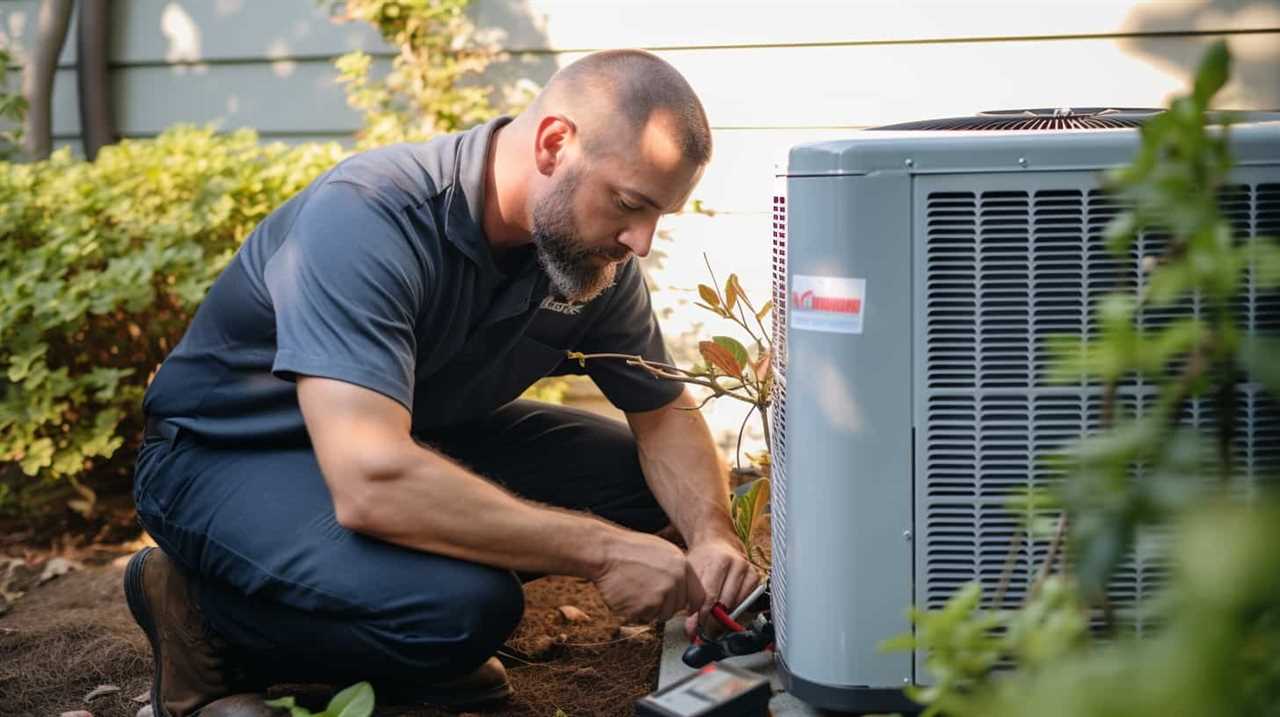
Climate Control
Unveiling the Thrifty Power of Energy-Efficient Heat Pumps

We’ve all experienced that feeling – anxiously awaiting the arrival of our monthly energy bill, trying to find ways to save money we worked hard for.
Well, look no further. Energy-efficient heat pumps are here to revolutionize the way we think about heating our homes. With their thrifty power, these innovative devices not only reduce energy consumption but also provide substantial long-term cost savings.
Let’s dive into the world of energy-efficient heat pumps and unveil the secrets to financial success and sustainability.
Key Takeaways
- Energy-efficient heat pumps can significantly reduce monthly utility bills through their energy consumption savings.
- Conducting a cost analysis is crucial to understand the cost-effectiveness of energy-efficient heat pumps, including evaluating initial investment cost, energy savings, and payback period.
- Energy-efficient heat pumps offer financial benefits such as lower utility bills, reduced maintenance costs, and potential incentives and rebates.
- Energy-efficient heat pumps provide long-term cost savings through reduced energy consumption, lower maintenance expenses, and longer lifespan.
Cost-Effectiveness of Energy Efficient Heat Pumps
We’ve discovered that energy efficient heat pumps can significantly reduce our monthly utility bills. To truly understand the cost-effectiveness of energy efficient heat pumps, a comprehensive cost analysis is necessary.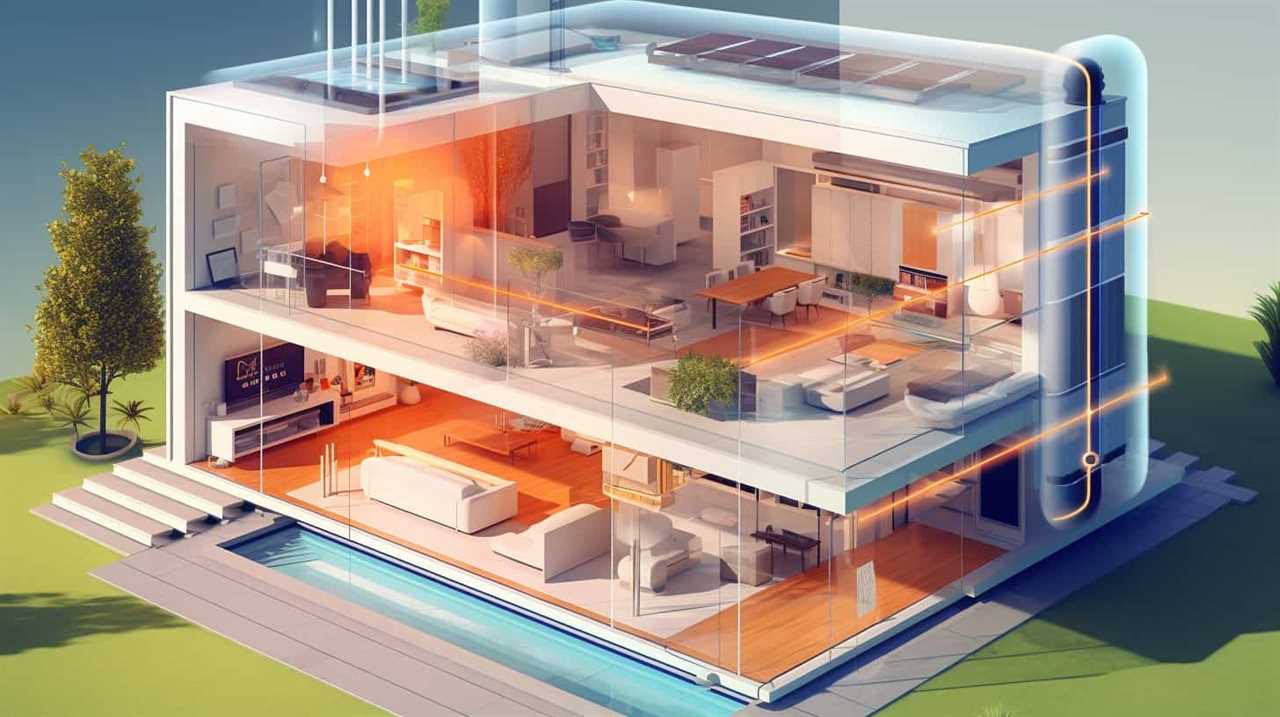
This analysis entails evaluating the initial investment cost, energy consumption savings, and the payback period. The initial investment cost includes the purchase and installation of the heat pump, as well as any necessary modifications to the existing infrastructure.
By comparing the energy consumption of energy efficient heat pumps to traditional heating systems, we can determine the potential savings over time. The payback period is the time it takes for the energy savings to offset the initial investment cost.
Through careful cost analysis, we can ascertain the financial benefits of energy efficient heat pumps and make informed decisions regarding their implementation.
Savings Potential of Energy-Efficient Heat Pumps
We can maximize our savings by utilizing energy-efficient heat pumps and making smart choices about our energy consumption. Energy-efficient heat pumps offer significant energy savings compared to traditional heating and cooling systems. By reducing energy consumption, we not only save money on our utility bills but also reduce our environmental impact.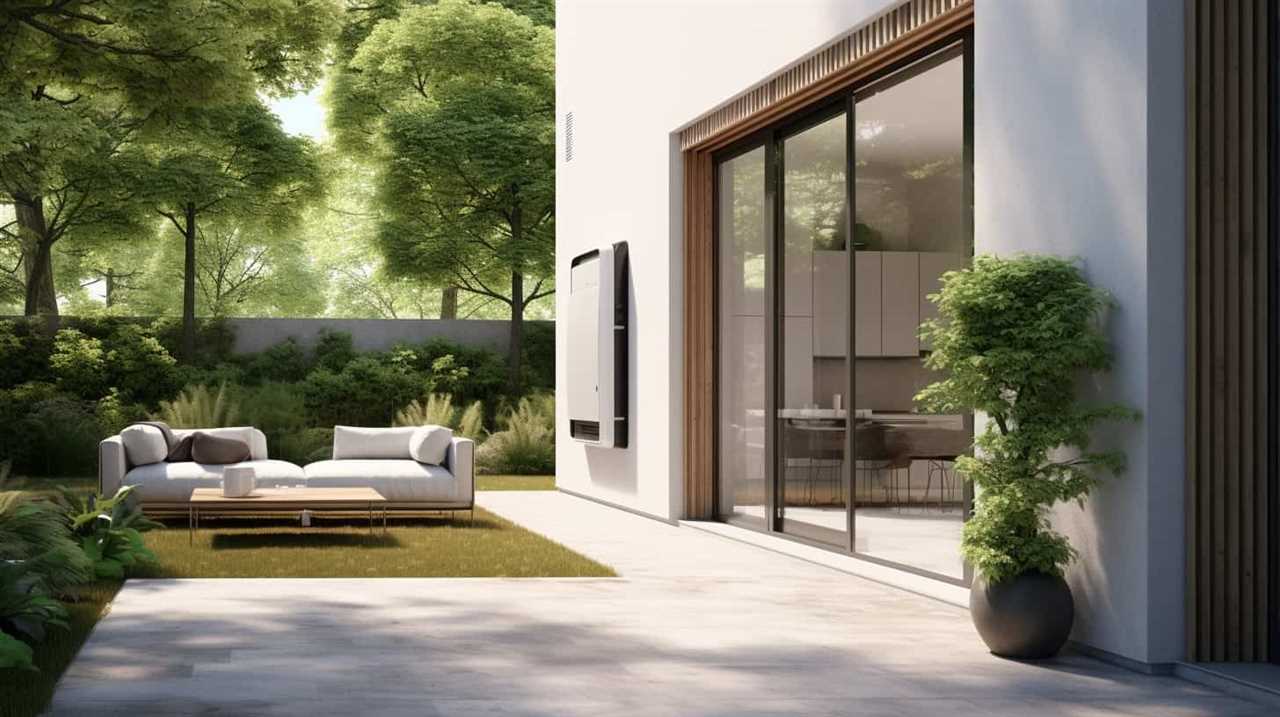
To illustrate the potential savings of energy-efficient heat pumps, let’s take a look at the following table:
| Energy Consumption | Annual Cost (Traditional System) | Annual Cost (Energy-Efficient Heat Pump) |
|---|---|---|
| Heating | $900 | $600 |
| Cooling | $800 | $500 |
| Total | $1,700 | $1,100 |
As we can see, by using energy-efficient heat pumps, we can save $600 per year on heating and $300 per year on cooling, resulting in a total annual savings of $600. Not only do these savings benefit our wallets, but they also contribute to a greener and more sustainable future.
Return on Investment for Energy-Efficient Heat Pumps
To determine the return on investment for energy-efficient heat pumps, let’s analyze the cost savings and payback period compared to traditional heating and cooling systems.
Conducting an ROI analysis is crucial in understanding the benefits of energy-efficient heat pumps and making informed decisions about their implementation.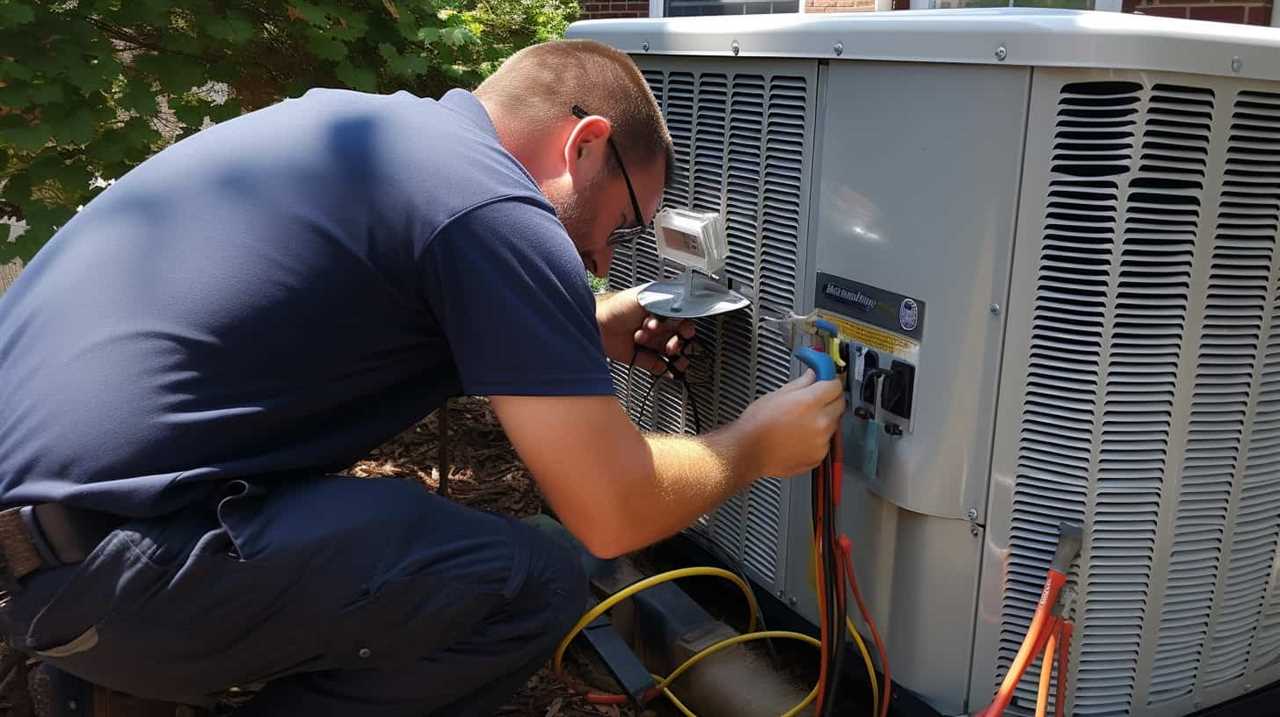
Energy-efficient heat pumps have several advantages that contribute to their positive ROI. Firstly, they consume significantly less energy compared to traditional systems, resulting in lower utility bills and operational costs.
Secondly, they’ve a longer lifespan and require less maintenance, reducing the overall expenses associated with heating and cooling.
Thirdly, energy-efficient heat pumps often qualify for various incentives and rebates, further enhancing their financial viability.
Lastly, their ability to provide both heating and cooling in a single system eliminates the need for separate units, saving on installation and equipment costs.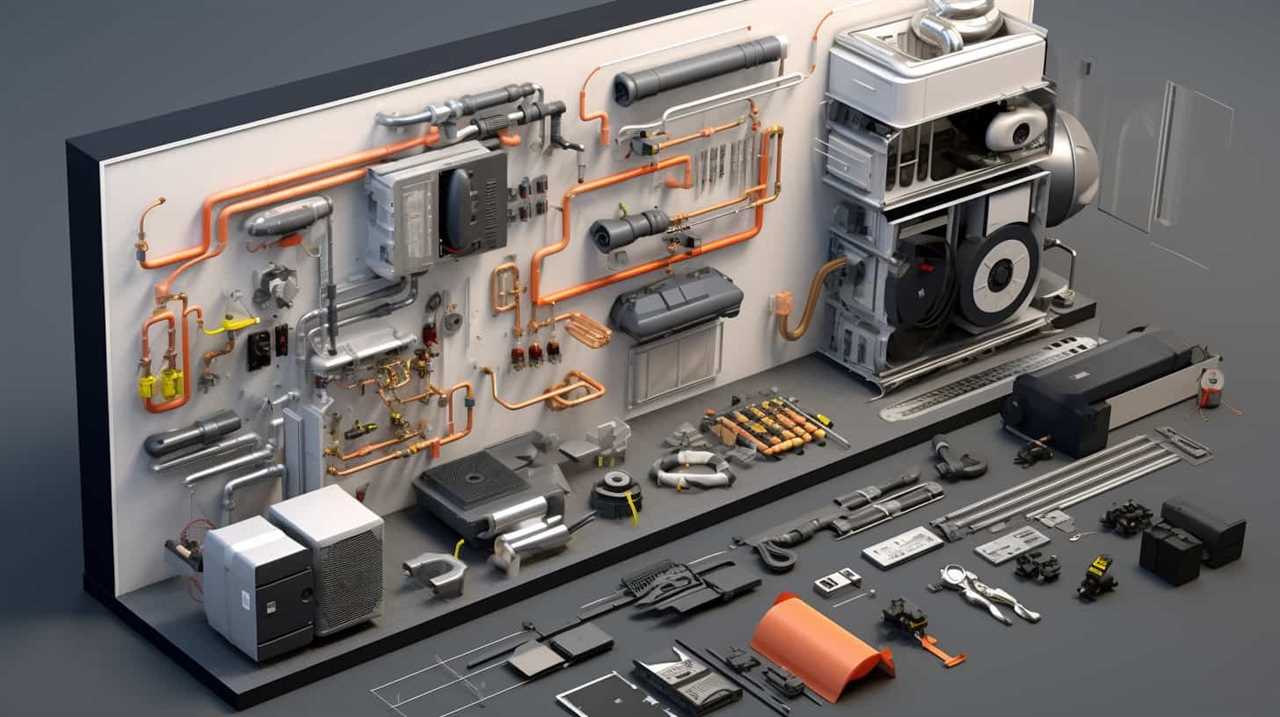
Financial Benefits of Choosing Energy-Efficient Heat Pumps
Choosing energy-efficient heat pumps provides both cost savings and environmental benefits. Not only do these heat pumps reduce energy consumption, but they also qualify for tax credits, further reducing their upfront cost. Additionally, energy-efficient heat pumps require less maintenance, leading to reduced maintenance costs in the long run.
To illustrate the financial benefits of choosing energy-efficient heat pumps, consider the following table:
| Financial Benefit | Description |
|---|---|
| Tax credits | Energy-efficient heat pumps qualify for tax credits, reducing the initial investment. |
| Reduced maintenance costs | Energy-efficient heat pumps require less maintenance, resulting in lower overall maintenance expenses. |
Long-Term Cost Savings With Energy-Efficient Heat Pumps
Over the course of several years, energy-efficient heat pumps can lead to significant long-term cost savings. Here are four reasons why investing in these pumps can result in substantial financial benefits:
Energy Efficiency: Energy-efficient heat pumps are designed to consume less electricity while providing the same level of heating or cooling. This translates to lower energy bills over time, resulting in long-term savings.

Reduced Maintenance Costs: Energy-efficient heat pumps are built with advanced technology that improves their durability and reliability. This means fewer breakdowns and repairs, leading to reduced maintenance expenses in the long run.
Government Incentives: Many governments offer incentives and rebates to encourage the use of energy-efficient appliances, including heat pumps. These financial incentives can help offset the initial investment and accelerate the payback period.
Environmental Impact: By consuming less energy, energy-efficient heat pumps contribute to reduced greenhouse gas emissions and environmental impact. This not only helps protect the planet but also positions homeowners as environmentally conscious individuals.
Frequently Asked Questions
How Does the Installation of Energy-Efficient Heat Pumps Impact the Overall Value of a Home?
Installing energy-efficient heat pumps positively impacts the overall value of our homes. They reduce energy consumption and provide long-term cost savings. These innovative systems are a smart investment for those seeking to minimize expenses and maximize efficiency.

Are There Any Government Incentives or Rebates Available for Purchasing Energy-Efficient Heat Pumps?
There are government incentives and rebates available for purchasing energy-efficient heat pumps. The installation of these pumps can also positively impact the overall value of a home.
Can Energy-Efficient Heat Pumps Be Used in Both Residential and Commercial Settings?
Yes, energy-efficient heat pumps can be used in both residential and commercial settings. A cost effectiveness analysis shows that these pumps can significantly reduce energy consumption and save money in the long run.
Are There Any Maintenance Costs Associated With Owning an Energy-Efficient Heat Pump?
Yes, there are maintenance costs associated with owning an energy-efficient heat pump. However, these costs are offset by the substantial energy savings that the heat pump provides, making it a thrifty investment in the long run.
What Are the Environmental Benefits of Using Energy-Efficient Heat Pumps Compared to Traditional Heating Systems?
Using energy-efficient heat pumps instead of traditional heating systems can lead to significant cost savings and a reduction in greenhouse gas emissions. For example, a case study showed a 40% decrease in energy consumption and a 30% decrease in carbon emissions.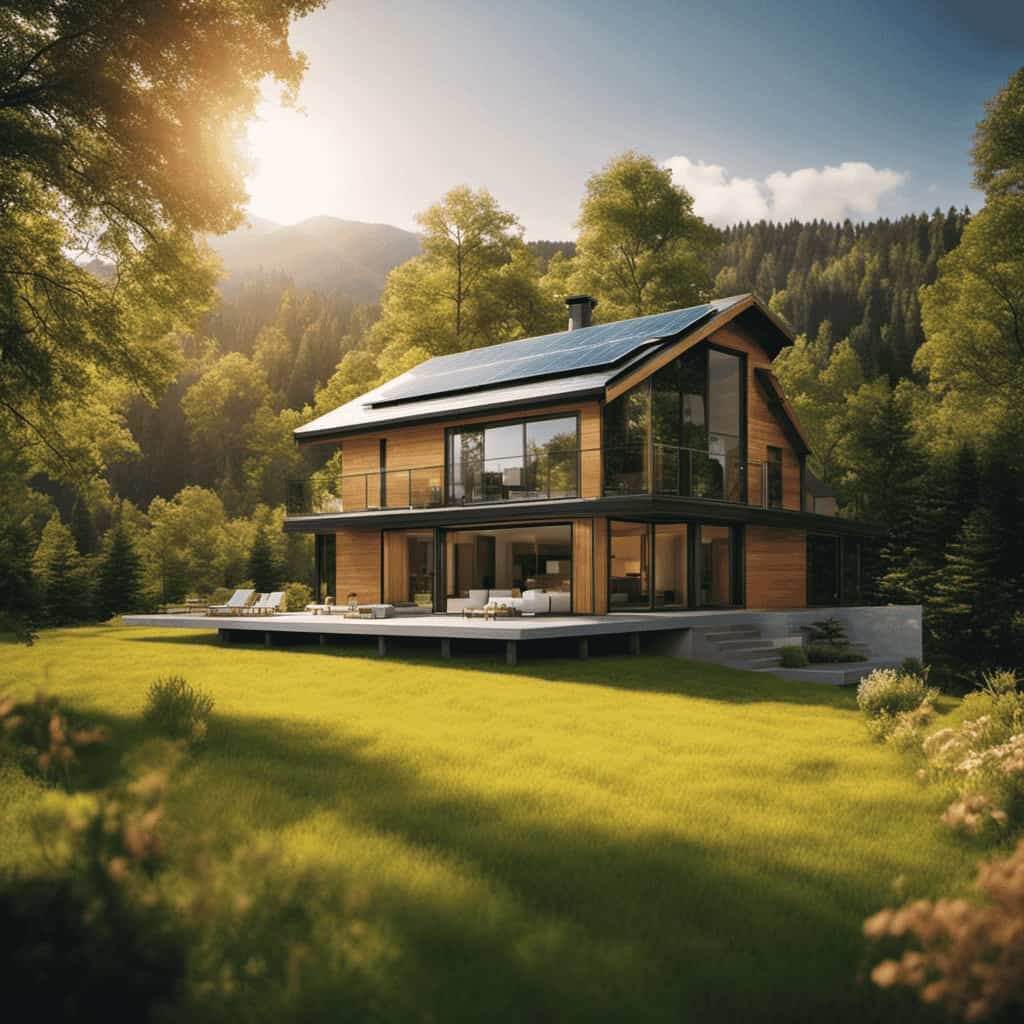
What Are the Benefits of Using Energy-Efficient Heat Pumps for Climate Control?
If you’re searching for cost-effective and environmentally friendly ways to regulate indoor climate, look no further than the perks of heat pumps for climate control. By efficiently transferring heat from one place to another, these systems provide optimal heating and cooling all year round. Enjoy reduced energy consumption, lower utility bills, and a smaller carbon footprint, all while maintaining a comfortable home temperature.
Conclusion
In conclusion, the cost-effectiveness of energy-efficient heat pumps is undeniable. With a potential savings of up to 50% on heating costs, the return on investment for these systems is impressive.
Choosing energy-efficient heat pumps not only provides financial benefits but also leads to long-term cost savings. Embracing this thrifty power can significantly impact our energy consumption and contribute to a more sustainable future.
-

 Residential and Commercial Applications2 weeks ago
Residential and Commercial Applications2 weeks agoBest Amana Heat Pump Reviews
-

 Thermal Energy Transfer2 weeks ago
Thermal Energy Transfer2 weeks agoBreakthroughs in Modern Heat Pump Systems: Thermal Energy Edition
-

 Residential and Commercial Applications2 weeks ago
Residential and Commercial Applications2 weeks agoBest Heat Pump
-

 Geothermal Heat Pumps3 months ago
Geothermal Heat Pumps3 months agoUpgrade Your Comfort with Our Efficient HVAC Systems
-

 Air Conditioning3 months ago
Air Conditioning3 months agoExploring Energy-Efficient Air Conditioning Heat Pumps
-

 Geothermal Heat Pumps3 months ago
Geothermal Heat Pumps3 months agoInnovative Geothermal Heat Pump Manufacturers Revolutionize Energy Efficiency
-

 Thermal Energy Transfer1 month ago
Thermal Energy Transfer1 month agoBoost Your Heat Pump Efficiency: Interactive Guide
-

 Residential and Commercial Applications2 weeks ago
Residential and Commercial Applications2 weeks agoBest Portable Heat Pump Heat & AC










